Years 7-9
Guide 2025-2026
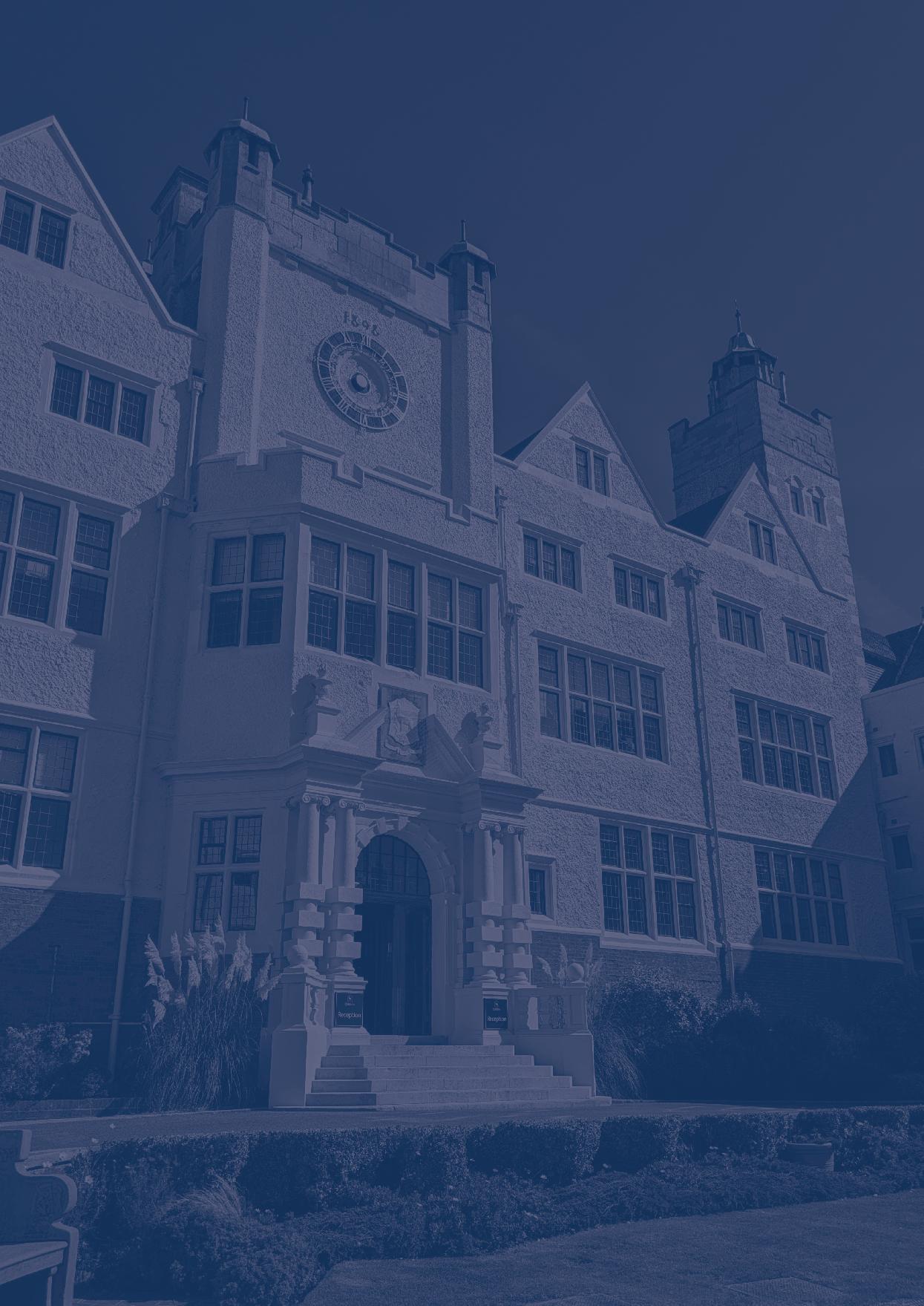
Girls First: Empowered, Encouraged, Engaged
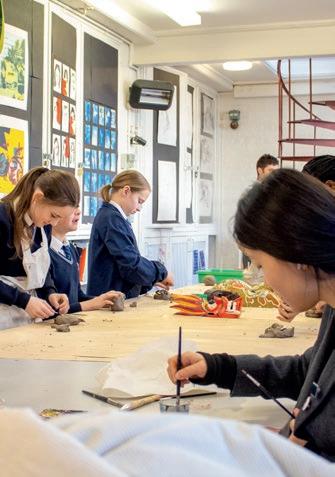
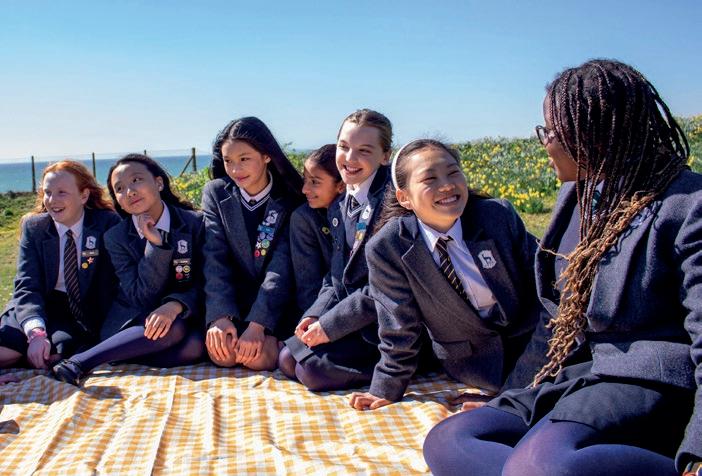
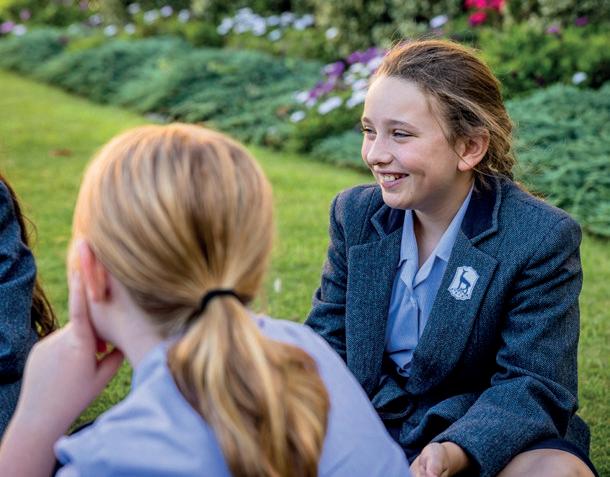
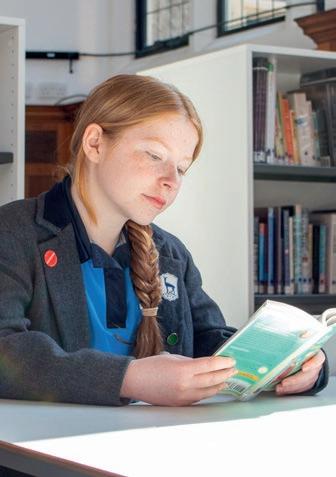
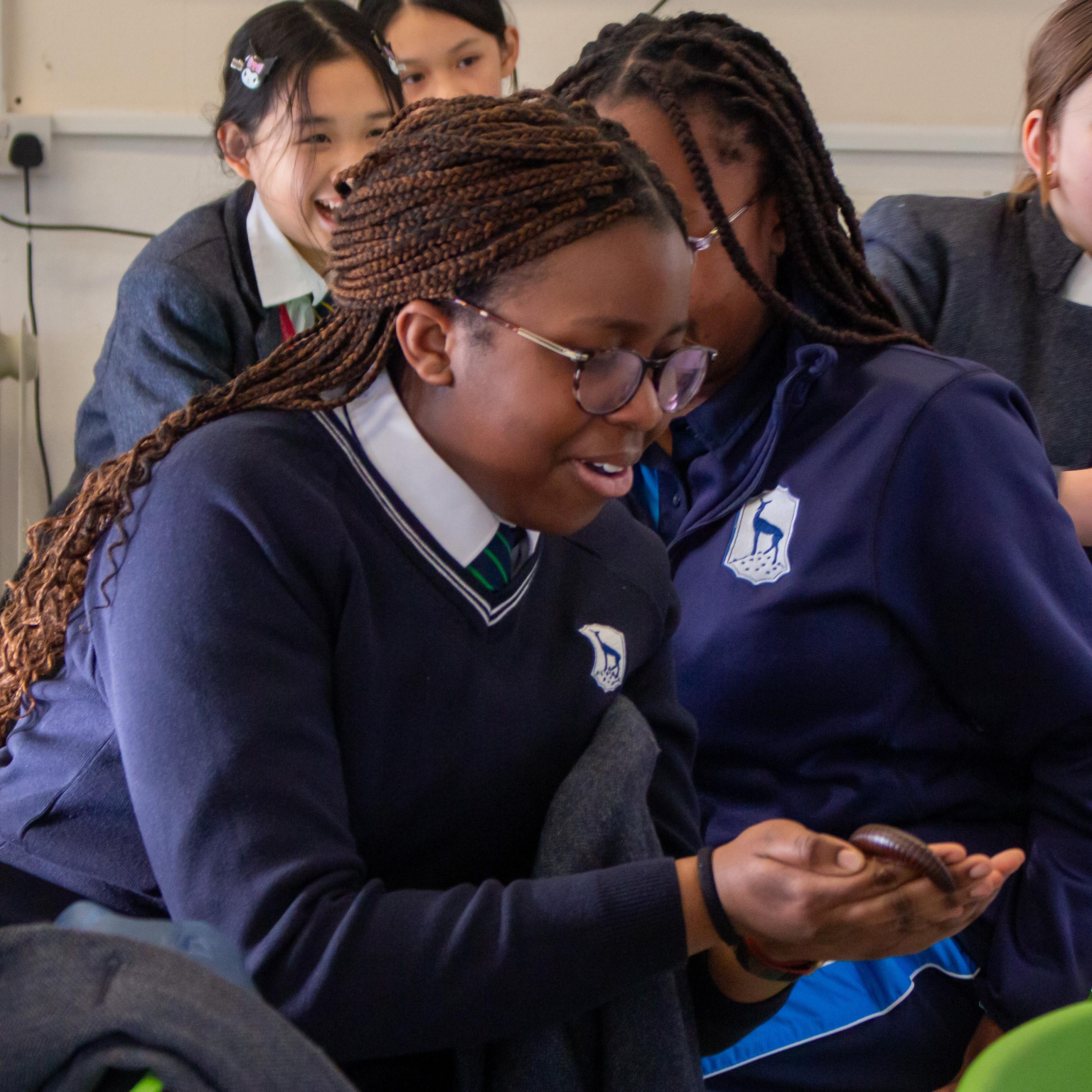
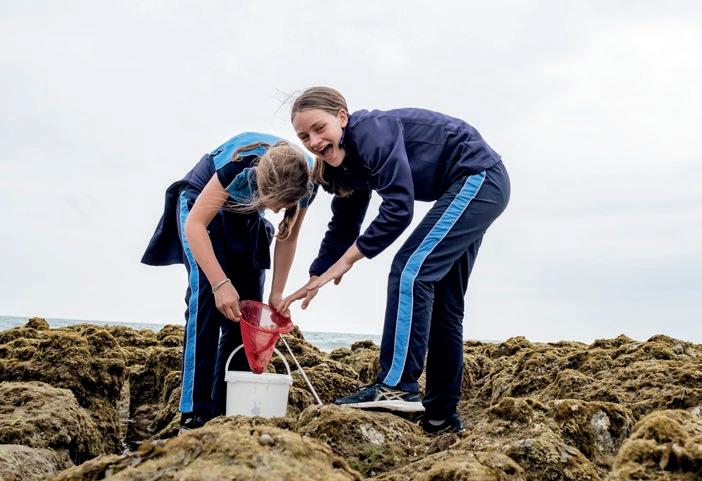
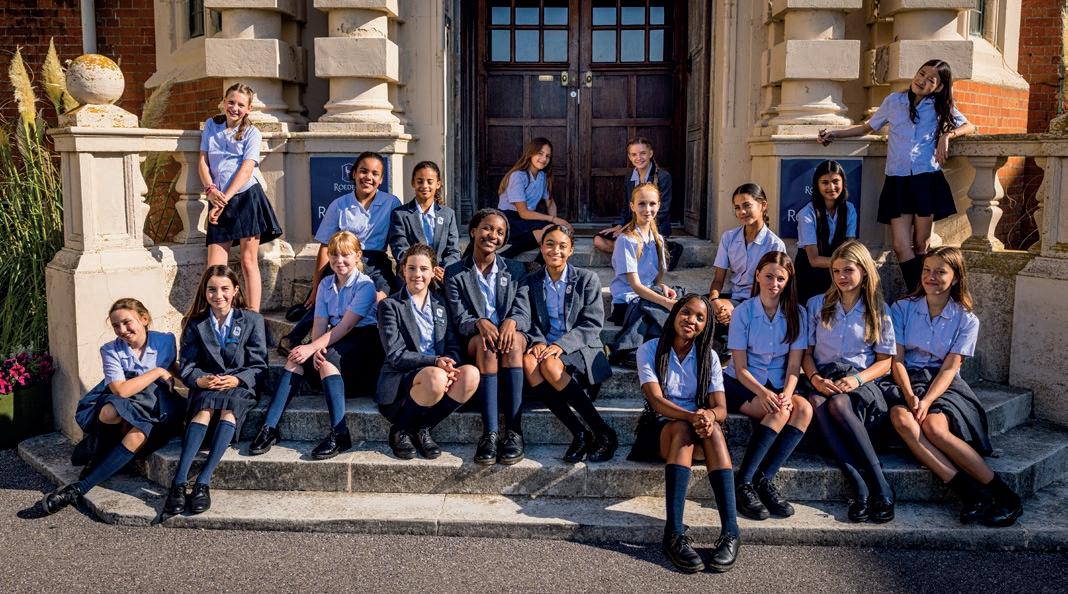

Years 7-9
Guide 2025-2026

Girls First: Empowered, Encouraged, Engaged







The transition from primary or prep school to senior school is a significant and exciting milestone in every girl’s educational journey.
At Roedean, we recognise how important these formative years are, both as a time of discovery and as the foundation for future success. Whether your daughter is joining us in Year 7 as she embarks on her senior school adventure or entering in Year 9 as she prepares for the challenges of GCSEs, we provide an exceptional curriculum that nurtures her curiosity, develops her confidence, and inspires a lifelong love of learning.
Our curriculum for Years 7 to 9 is designed to engage younger students fully, allowing them to explore a rich breadth of subjects and begin to identify their strengths, talents, and passions. This breadth is maintained until the end of Year 9, ensuring girls are well equipped to make informed and ambitious choices as they move towards their GCSE studies. For those entering Roedean in Year 9, this year serves as a vital base year for GCSE preparation, enabling them to settle in, broaden their academic horizons, and benefit from our distinctive approach to learning.
Girls enjoy an exciting array of subjects – from Modern Languages to Geography, from Classical Civilisation to the Sciences, and from Mathematics to Dance. Five periods of Sport each week ensure there is something for everyone, with opportunities to enjoy traditional team games alongside activities such as trampolining, equestrian pursuits, and swimming in our stunning cliff-top pool.
At Roedean, learning is a collaborative and dynamic experience. Lessons are 50 minutes long and are designed to spark curiosity and ignite engagement, combining individual, paired, and group tasks that encourage collaboration and help to build meaningful relationships with peers and teachers alike. Our ethos is to create a stimulating environment where girls are encouraged to think deeply, share their ideas with confidence, and support one another in developing their academic and personal passions.
We want every Roedean girl to feel empowered to take intellectual risks, ask challenging questions, and contribute freely in every lesson. This culture of exploration and academic rigour, combined with the support of inspirational teaching, ensures that each student is challenged and celebrated as she develops into a confident, independent learner ready for the next stage of her education.
The academic journey through Years 7 to 9 at Roedean is a time of exploration, growth, and discovery. These three years provide an exceptional foundation for girls to develop their intellectual curiosity and to build the knowledge, skills, and confidence that will prepare them for the challenges of GCSEs and beyond.
At this stage, students benefit from a stimulating and diverse curriculum, with lessons across a full complement of 20 subjects. From the Sciences to Modern Languages, from Classical Civilisation to Dance, the breadth of study allows every girl to uncover new passions and develop existing talents. Each year group follows a thoughtfully structured prep timetable, ensuring that time for independent study is balanced across subjects and supports progress outside of the classroom.
Beyond lessons, Roedean offers a rich array of academic opportunities designed to inspire and challenge. The Roedean Academic Lectures bring in expert speakers from a variety of fields, broadening horizons and encouraging students to think beyond the curriculum. Girls are also invited to join – and even lead – a vibrant mix of student-run clubs and societies, where they can pursue topics that ignite their interest and deepen their understanding of the world.
In every lesson, students are encouraged to engage fully with their learning, to embrace extension activities, and to stretch themselves academically. For those seeking an additional challenge, there are subject competitions and national academic challenges in which they can participate. Heads of Department are on hand to guide and support girls who wish to take their learning even further.
The curriculum is also enriched by a programme of trips and excursions that bring subjects vividly to life. These range from immersive five-day language trips abroad to visits closer to home – such as exploring historical sites or attending theatre productions. While optional, these experiences often provide students with fresh perspectives on their studies and can accelerate their learning in exciting and memorable ways.
To help students track their progress, examinations are held at the end of each academic year. These assessments enable teachers to tailor their support and provide constructive feedback to help every girl achieve her full potential. Revision booklets and study guides are provided, equipping students with effective strategies to prepare for exams with confidence. For those requiring additional arrangements, the Examinations Officer works closely with the Special Educational Needs Coordinator (SENCO) to ensure every individual is supported.
Over these three years, Roedean’s academic programme not only develops knowledge but also instils habits of independent thought, intellectual rigour, and a love of learning – preparing each girl for success as she moves confidently towards her GCSE years.

Pastoral care is at the heart of everything we do at Roedean, underpinning every aspect of school life and ensuring that each student is seen, known, heard, and feels that they truly matter.
We believe that when students feel valued and supported, they are empowered to flourish both academically and personally. Our strong and highly experienced pastoral team works seamlessly across the academic and boarding spheres, with Tutors, House staff, and dedicated Pastoral Managers providing a consistent network of care. This holistic approach means that every girl is known as an individual, with her wellbeing and personal development given as much priority as her academic success. By fostering a culture of kindness, respect, and open communication, we equip students with the resilience, confidence, and emotional intelligence to navigate challenges and thrive at school and beyond. At Roedean, wellbeing is not an addition, it is essential, and it lies at the core of the transformative education we provide.
Tutors and tutor groups are a central component of pastoral care. Each girl is placed in a small tutor group led by a dedicated Tutor who acts as the first point of contact for both the student and her parents. Tutors meet regularly with their tutees, offering guidance on academic progress, personal development, and wellbeing. They work closely with House staff and teaching colleagues to monitor each girl’s journey through the school, celebrating successes and providing timely support where needed. This personalised approach fosters strong relationships, builds confidence, and ensures that every student feels a sense of belonging within the Roedean community.
Even in the lower years of the school, girls at Roedean are encouraged to explore and develop their leadership potential. There are countless opportunities to step forward and practise these skills, whether through representing their peers on the School Council, acting as a Form or Charity Representative, or taking the lead during trips and group activities.
In Years 8 and 9, students might also take on the role of buddy to a girl in Year 7, offering support and guidance as she navigates her first months at Roedean. This mentoring relationship helps younger students settle into school life with confidence while giving older girls valuable experience in leadership, empathy, and responsibility.
As students progress through Year 9, they begin an important journey towards their GCSE years. At Roedean, this transition is carefully supported by both the academic and pastoral teams, ensuring that every girl feels confident and fully prepared to make informed choices about her future studies.
Time is dedicated throughout the year to exploring GCSE options in depth. This process is woven into year group assemblies, tutor periods, Future Friday sessions, oneto-one meetings with academic staff, and PSHE lessons, allowing each student to reflect on her strengths, interests, and aspirations. Parents are also included in this journey, fostering a shared understanding of the pathways available and the opportunities that lie ahead.
By the end of Year 9, every girl is equipped with the knowledge and guidance she needs to make choices that play to her strengths and passions, setting a firm foundation for success in her GCSE years and beyond.
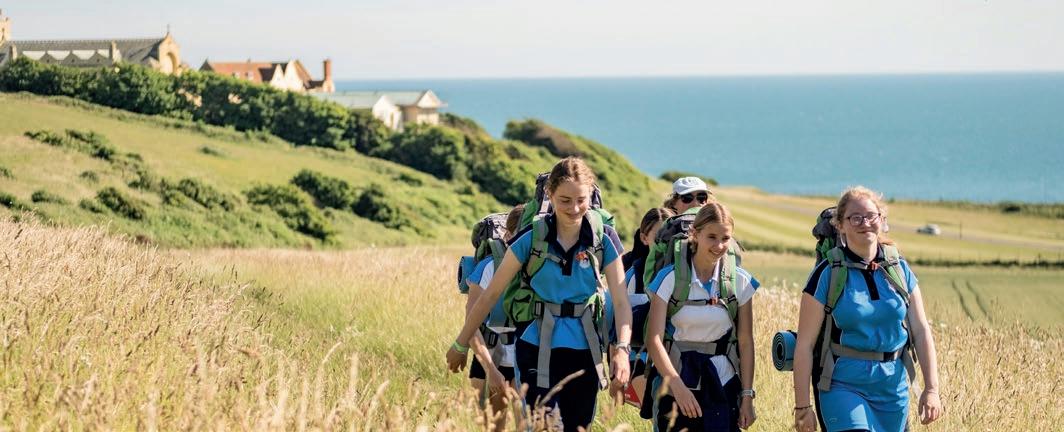
At Roedean, Years 7 to 9 are about more than just academic study, they are a time to discover passions, develop talents, and grow in confidence through a wealth of opportunities beyond the classroom.
The school’s extensive Co-Curricular programme is designed to inspire every girl to step out of her comfort zone, try something new, and flourish as part of a vibrant and dynamic community.
With a wide range of clubs, societies, and activities on offer, there truly is something for everyone. From music, drama, and dance productions to STEM clubs, debating, creative writing, and art, Roedean girls enjoy countless opportunities to explore their creativity and intellectual curiosity. Sport is equally diverse and inclusive, offering options from traditional team games to sailing, fencing, yoga, and equestrian pursuits, ensuring every student can find activities she enjoys and excels in.
During Years 7 to 9, students are also invited to attend a rich programme of weekly lectures featuring guest speakers from a variety of fields. These sessions are designed to broaden horizons and spark curiosity, providing insights into topics far beyond the traditional curriculum. Academic seminars and student-led societies further encourage exploration, empowering girls to take ownership of their interests and to share their passions with others.
In Year 9, girls take their first steps into the Duke of Edinburgh’s Award scheme by undertaking the Bronze Award. This offers an exciting chance to build resilience, teamwork, and independence through volunteering,
physical challenges, skill development, and an unforgettable expedition experience.
Roedean places great importance on creating a balanced and fulfilling experience during these formative years. Alongside academic studies and the Head, Hand, Heart provision embedded in their timetables, students are encouraged to immerse themselves in a wide variety of enrichment opportunities at lunchtime and after school.
Roedean’s commitment to partnerships and community engagement further enhances the co-curricular landscape. Students are encouraged to support local charities, mentor younger pupils in partner schools, and contribute to initiatives with a global impact. Central to this ethos is the Roedean Diploma, which incorporates activities linked to Innovation, Impact, and Inspiration. It recognises students’ engagement across co-curricular activities, encouraging them to reflect on their experiences, set ambitious goals, and develop a portfolio of achievements. Exceptional commitment and growth are honoured with Distinction, acknowledging their dedication and contribution.
This holistic approach reflects Roedean’s “girls first” philosophy, empowering students to build confidence, embrace leadership, and prepare for success in every facet of life beyond school.
To complement the academic programme, Roedean offers an inspiring initiative for students in Years 7 and 8, ‘Wild Fridays’, a thrilling programme designed to empower girls and foster a deep appreciation for the natural world that surrounds them.
Each half term brings a diverse array of activities that turn Friday afternoons into a playground for exploration, creativity, and growth. From Bushcraft, Meteorology, and Farming to Sailing, Horticulture and Land-yachting, students embrace challenges that nurture resilience, teamwork, and a sense of adventure.
‘Wild Fridays’ embodies Roedean’s commitment to holistic education. It encourages girls to step beyond the classroom, develop practical life skills, and discover new passions in a setting that is both inspiring and transformative. By engaging with nature and hands-on projects, students in Years 7 and 8 learn to think creatively, approach challenges with confidence, and thrive in a wide range of experiences.

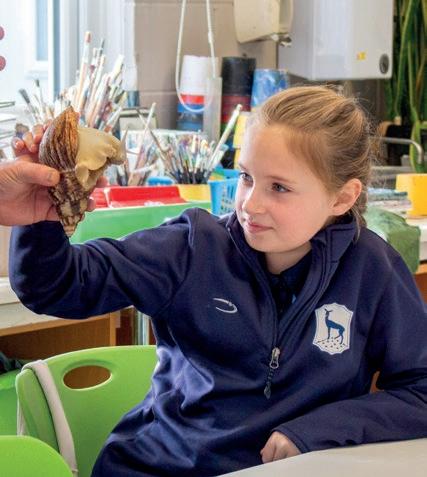
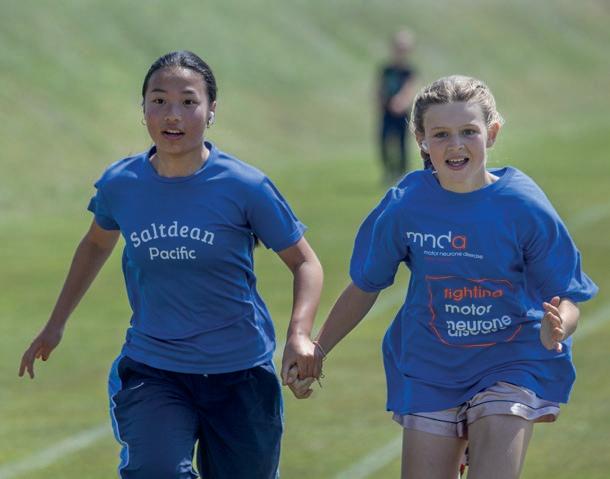

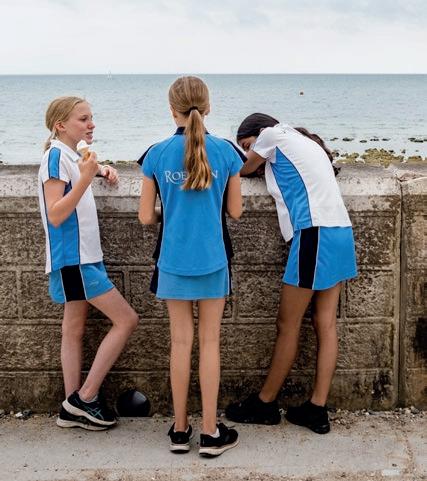
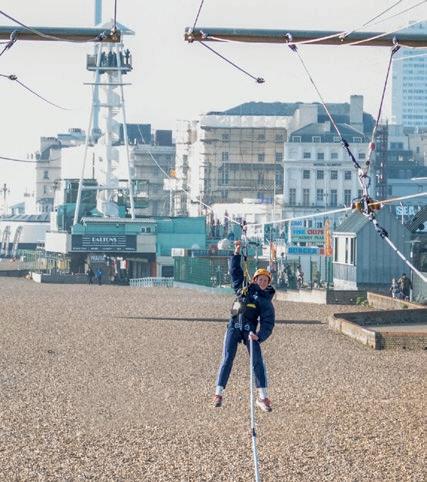
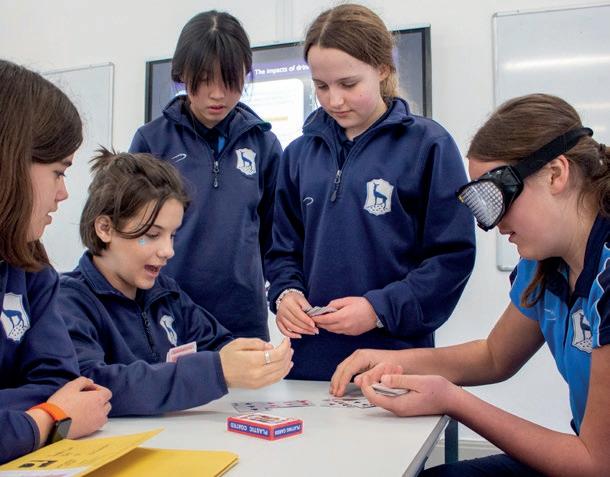
Head of Art Pathways:
Mrs S Strachan
The Years 7 to 9 scheme of work sets out broad themes which can be extended for those of you who work at a faster pace or require more challenge. There is a full scholars’ programme and the studios are often open during breaks, lunchtime and after school with staff on hand to assist those who wish to continue their classwork.
The Art department always strives to help each individual have a sense of achievement in making and creating artwork. The practical needs of those who find physical tasks difficult are addressed individually and all schemes of work can be adapted to individuals to allow for specific needs with teachers building differentiation and extension tasks into every lesson
Students will embark on an exciting journey of artistic discovery, building strong foundations in key skills such as mark making, colour mixing, and observational drawing. They study a variety of influential artists, including Vincent Van Gogh, Patrick Caulfield, Eduardo Paolozzi, and the Bloomsbury Group, gaining an understanding of their styles and historical contexts.
Beginning with first-hand observational drawings, students explore mark making and apply these techniques to develop designs for textured, bas-relief clay tiles. They produce creative work that reflects their ideas and experiences, becoming proficient in drawing, painting, sculpture, and a range of art, craft, and design techniques.
Throughout the year, students learn to evaluate and analyse their own work and that of others, using the language of art, craft, and design. The focus is on developing confidence in experimenting with materials and processes while fostering an appreciation for the historical and cultural development of art. They also gain a deeper understanding of the formal elements, including form, pattern, and colour.
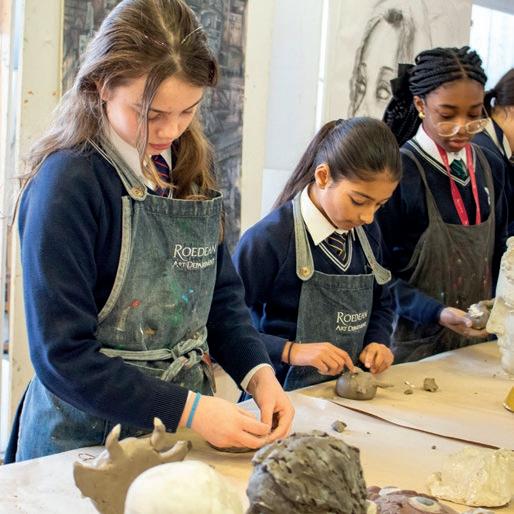
Students will learn about portrait painting, Cubism, and printmaking. Beginning with drawing from direct observation, they will study the proportions of the face and develop the ability to understand and analyse the work of other artists, leading to the production of a self-portrait painting.
The Year 8 curriculum aims to enable students to produce creative work, explore ideas, and record experiences. Students will become more proficient in drawing, painting, sculpture, and other art, craft, and design techniques. They will also learn to evaluate and analyse creative works using the language of art, craft, and design. As part of this, students will continue to expand their knowledge of significant artists, craft makers, and designers, while developing an understanding of the historical and cultural contexts of art.
Students will record from first-hand observation using a variety of media, develop their ideas, and investigate the possibilities of different materials and processes. They will experiment with tools and techniques, applying these to a range of artistic practices, including drawing. Throughout, students will be encouraged to review their own work and that of others critically, expressing their thoughts and feelings about art. They will also build an understanding of the formal elements in art, including colour, composition, proportion, and form.
Students will continue to develop their drawing techniques, create artwork in both two and three dimensions, and produce structures and sculptures while working collaboratively and independently. In the second term, they will undertake an independent learning project, introducing a more thematic approach to their work.
Through drawing and photography, students will record ideas inspired by natural forms such as pods, explore how to describe form through the use of tone, and investigate the work of artists and photographers including Karl Blossfeldt, Laura Ellen Bacon, and Peter Randall-Page. This research will inform the development of their own ceramic pot designs.
Students will refine their skills in drawing from first-hand observation, painting, sculpture, and a range of other art, craft, and design techniques. They will learn to evaluate and analyse creative works, using the appropriate language of art, craft, and design. In addition, they will begin to explore the historical and cultural development of art in relation to their own work.
Experimentation with materials and processes is a key focus of Year 9 projects. Students will try out different tools and techniques, applying them to a variety of media in both two and three dimensions. They will also deepen their understanding of the formal elements of art, including form, tone, and texture.
Every year group enjoys an annual Art and Design trip. This Year we offered Junior Art Club, Digital Photograph and Senior Etching, Oil Painting, Textiles and Printmaking.
Students will develop the ability to communicate their ideas and experiences through a range of carefully structured activities. Recognising drawing as the foundational skill for Art and Design, all girls are supported in building confidence, technical competence, and creative imagination in this area. Students will engage with both traditional and contemporary media, gaining an understanding of the suitability and expressive potential of each. Individual approaches will be encouraged and nurtured. Cognitive and literacy skills will be enhanced through structured class discussions and independent research. Students will be guided to reflect critically on their own work and that of others, forming and articulating judgements both orally and in writing. Opportunities to explore artworks from diverse historical periods and cultural contexts will also be provided, with particular emphasis on the school’s commitment to Black History and Cultural Diversity.

Head of Classics:
Mrs C Allen
Business is not solely a theory-based subject; students explore real-life businesses, many of which they already recognise. Through the study of Business, they investigate organisations and the global, ever-changing environment in which they operate. The course develops an understanding of the practicalities of running a business and explores the factors that contribute to success or failure.
The Classics department introduces students to the Classical world in Year 7. From the outset at Roedean, students begin their Latin studies using the de Romanis: dei et deae (About the Romans: gods and goddesses) course. Over the course of the year, they will encounter a range of vocabulary and grammatical forms, enabling them to translate passages based on Roman mythology. Students will also learn about the Olympian gods and Roman heroes such as Aeneas.
The language programme includes the introduction of the perfect and imperfect tenses, as well as three distinct noun cases, providing a strong foundation for further study. Vocabulary is drawn from the core set used at GCSE, ensuring students are well-prepared for progression in the subject.
Students continue with the de Romanis: dei et deae (About the Romans: gods and goddesses) course in Year 8. Through the passages studied, they will learn about early Roman history and the achievements of Roman heroes and heroines.
Students’ language knowledge is further developed as they study additional tenses and verb forms, irregular verbs, and prepositions, while also extending their vocabulary. The groundwork for GCSE study begins at this stage, with the course designed to provide a firm foundation for those who wish to pursue Classical subjects further up the school.
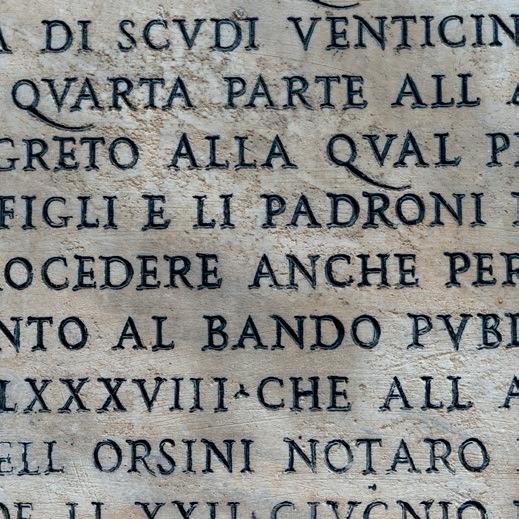
Students will use John Taylor’s Latin to GCSE course, an excellent resource that introduces the specified vocabulary and grammar necessary for success in the Latin GCSE. Starting a new textbook ensures all students engage with the same course content, regardless of prior experience, while offering numerous extension opportunities to challenge those who wish to deepen their learning.
Alongside the language work, students explore a variety of cultural topics, including Roman chariot racing and amphitheatres. The curriculum is enriched through the use of e-learning resources such as Quizlet, enhancing the classroom experience.
The course progressively increases in difficulty throughout the year. By the end of Year 9, students who wish to continue with Latin will have a clear understanding of what the GCSE entails and be well-prepared to achieve success should they choose to pursue it. Latin often becomes a standout GCSE subject for many students.
The Classics department is renowned for its enthusiasm for trips and experiential learning. Whether organising overseas tours to Greece, Rome, or the Bay of Naples, arranging theatre visits to see Greek tragedies in London, or inviting museum experts to Roedean for Roman food demonstrations, the department is committed to bringing the ancient world to life.
In addition, the department plays an active role in Humanities weeks, organising essay competitions and debates to further engage students in Classical studies.
Over the course of the three years, students develop key skills in the close analysis of texts. Every Latin sentence must be carefully and logically ‘unpicked’ and understood before attempting translation. This skill of logical analysis and deduction is a valuable life skill that can be applied across many contexts.
Additionally, students learn to recognise Latin derivations in the English language, significantly enriching their understanding of English vocabulary.
Finally, students develop the ability to synthesise knowledge; grammar rules often apply across different languages, and as students gain confidence in one language, they are better able to identify connections with others. This broad linguistic understanding exemplifies the power of knowledge.
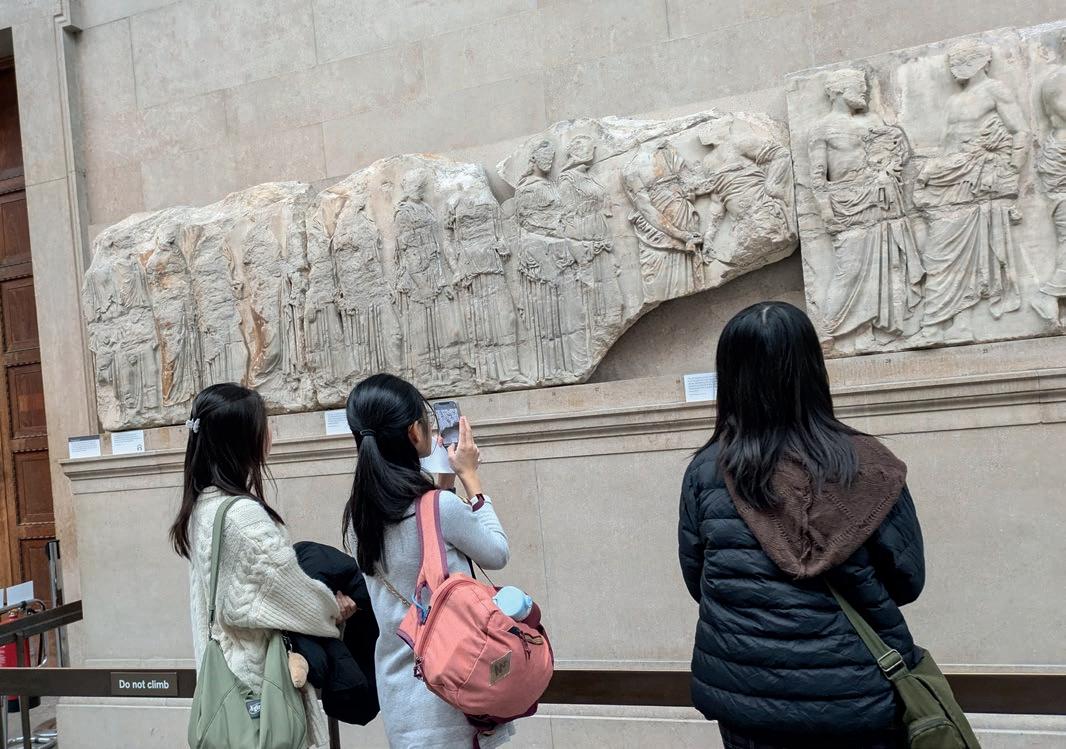
Head of Dance:
Mrs S Abaza
Students will be introduced to the fundamental principles of dance through a variety of styles and techniques. They will develop an understanding of key vocabulary and explore different creative processes within dance. Additionally, students will learn the essential principles of choreography, enabling them to create and organise their own dance works.
Students will focus on the key principles of dance, including basic warm-up routines, safe warm-up techniques, spatial awareness, counting, travelling, and turning. Each term has a different focus. In Term 1, students develop their knowledge and skills in Contemporary Dance, studying two key practitioners in this style. Term 2 builds on jazz technique, with students learning performance routines in this genre. Term 3 introduces students to the fundamentals of choreography.
Students will continue to build on the key principles of dance. In Term 1 you will develop your knowledge of Contemporary dance from Year 7 looking at two practitioners and their unique style, where you will learn repertoire and routines in the style of these practitioners. In Term 2 you will focus on Jazz and social dance styles building your knowledge and skills in these areas. In Term 3 you will focus on Bollywood dance and an introduction to Street Dance.
Students will build on their Year 8 skills by developing their Street Dance techniques, with a focus on the company ZooNation. Term 2 centres on Jazz and its subgenres, where students study key practitioners such as Bob Fosse and deepen their understanding of lyrical Jazz. In Term 3, students engage in choreographic tasks and problem-solving through creative activities. Additionally, they are introduced to elements of the GCSE Dance syllabus.
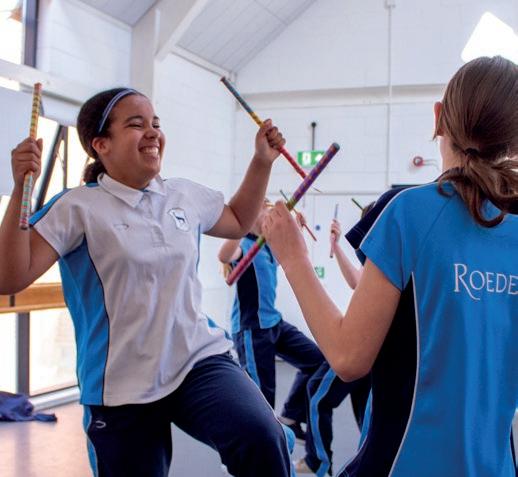
In addition to the curriculum dance programme, the school offers several clubs that all students are encouraged to join. These clubs take a fun and inclusive approach to developing new skills, catering to all ability levels.
All Year 7 to 9 students have the opportunity to take part in a dance workshop during the year, allowing them to build their skills and explore different styles.
In the Spring Term, students can audition for the Afternoon of Dance, an event open to all year groups where they may choose to perform solo or as part of a group. In the Summer Term, the annual Roedean Dance Showcase celebrates the work of students participating in extra-curricular lessons and features original choreography by the school’s dance teachers.
Throughout Years 7 to 9, students develop a wide range of skills, including technique, fitness, coordination, and collaboration. Students also build confidence and competence in choreography and in presenting their dance skills to an audience.


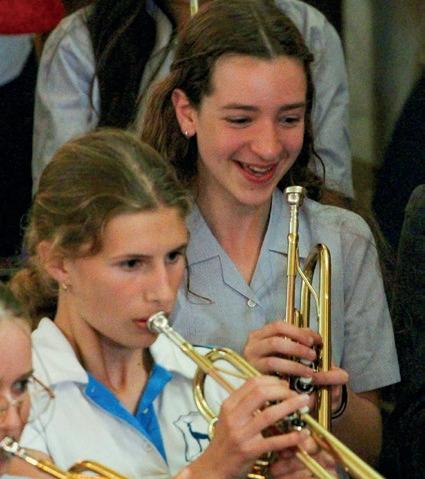
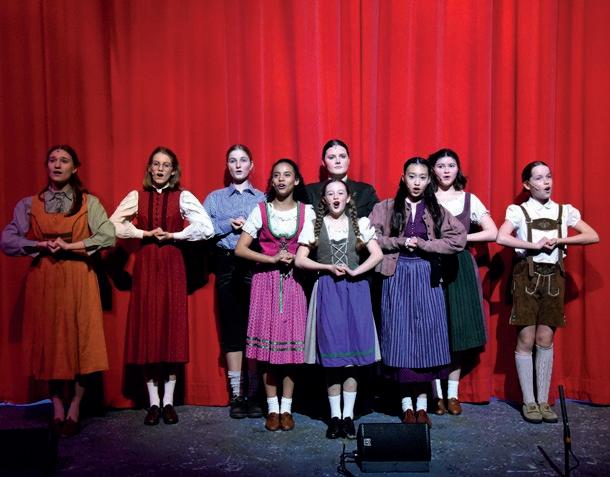

Director of Drama:
Mrs S Woodbridge
During Years 7 to 9, the aim of the Drama department is to provide all students with exciting and challenging opportunities during their lessons to develop their confidence as performers and communicators. Drama offers a unique learning experience, with lessons that are practical and exploratory in nature. Group work forms the foundation of each session, encouraging students to take responsibility for shaping outcomes. With guidance from their teachers, they learn to collaborate effectively and work successfully as part of a team.
Students will be introduced to the key skills and approaches to Drama that form the foundation of the Years 7 to 9 course. They develop their performance skills, study and explore a Shakespearean play and a musical through practical work, and create their own pieces of storytelling theatre.
• Drama Skills: An introduction to the essential skills of creating and performing drama, which are developed throughout the course
• Exploration of a Shakespearean Comedy: An introduction to the theatre-making process, from ‘Page to Stage’
• Improvisation: Developing imaginative and creative thinking skills, with an emphasis on adopting a range of roles
• Storytelling Theatre: Exploring techniques for communicating story, culminating in a polished performance
• Musical Theatre: Investigating performance techniques specific to musical theatre, focusing on a selected work
Students will continue to build on their core skills while exploring the ideas and techniques of different theatre practitioners. They stage scenes from a contemporary play, develop their improvisation skills further, and are introduced to Physical Theatre and mask work.
• Exploring a Theme: Developing skills through the exploration of real-life issues using improvisation
• Physical Theatre and Mask Work: Learning techniques and conventions of Physical Theatre and developing physical expression
• Devising Drama: Applying knowledge and skills from previous units to create a devised, polished performance for a target audience
• Theatre Roles: Gaining insight into all aspects of theatre-making, including lighting, sound, directing, and designing
• Text Study: A practical exploration of a contemporary play text
Students will begin to refine their performance skills, experiment with different theatrical styles, and create two polished pieces for an audience. The year consolidates prior learning and introduces elements of the GCSE course.
• Skills Unit: Building on Years 7 and 8 to prepare for GCSElevel work
• Characterisation: Studying Stanislavski’s ‘system’ for actors and developing improvisations to extend versatility
• Theatre Genres: Exploring extracts from a range of plays representing different theatrical styles
• Text Study: A detailed ‘Page to Stage’ process, leading to a polished performance
• Devising Theatre (Double Unit): A culminating creative project that consolidates all Lower School Drama learning, ending with a performance for an audience
There is a busy and varied programme of extra-curricular opportunities throughout Years 7 to 9, and all students are encouraged to take an active role. Each year group is offered a dedicated theatre trip, alongside several optional trips open to all year groups, providing the chance to experience a range of performances – from Shakespeare to musicals –in both local venues and major London theatres.
Weekly activities include a Drama Club and a Technical Theatre Club, offering students opportunities to develop performance and backstage skills. One year group also takes part annually in the Shakespeare Schools Festival, and there are plans to join the National Theatre’s Connections Festival in the near future.
The department stages an annual whole-school production, and the summer term culminates with a dedicated Years 7 to 9 production. With large casts and performances presented in the school’s professionally equipped theatre, all students are given the opportunity to participate and gain valuable stage experience, supported by an experienced technical team.
Through their Drama studies, students develop a broad range of transferable skills that support their growth as performers, collaborators, and creative thinkers. Students:
• learn to become effective and confident communicators
• develop valuable group-work and collaboration skills
• extend their performance and expressive abilities, both vocally and physically
• gain an understanding of the theatre-making process, developing their own acting and directing skills
• explore theatre history and build practical skills in a range of performance styles
• learn about the technical and design elements of staging plays, with opportunities to develop their own ideas and expertise
• enhance their creative thinking and problem-solving processes
• learn to articulate their creative ideas and opinions with clarity
• develop empathy, learning to understand and inhabit different perspectives
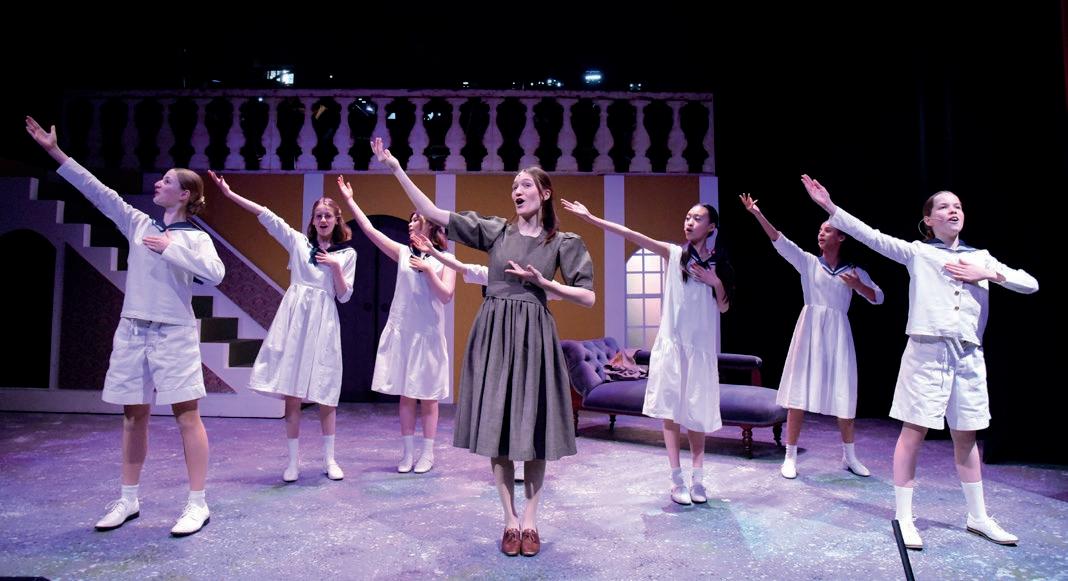
Head of DT:
Mrs H Quirk
Through a variety of creative and practical activities, students develop the knowledge, understanding, and skills required to engage confidently in the processes of designing and making. Using creativity and imagination, students will design and create products for a range of contexts, considering not only their own needs but also those of others.
Students will acquire a broad base of subject knowledge and draw on disciplines such as Mathematics, Science, Engineering, Computing, and Art. Alongside technical skills, students are encouraged to take risks and to think resourcefully and innovatively, nurturing the qualities of enterprising and capable individuals prepared to contribute positively to the world around them.
In the Autumn term, students complete a STEM team challenge focusing on forces and stresses, developing design solutions through research and collaborative model-making activities. They build a bridge structure and subject it to stress testing against set criteria.
In the Spring term, students are introduced to mechanisms and to Computer-Aided Design (CAD) and Manufacture (CAM). They design and develop an original jumping jack toy, using CAD software to create a functional design. This is then laser-cut from plywood, decorated using the heat press, and assembled by hand.
In the Summer term, students learn to use a range of hand tools and workshop processes to work with wood, creating a pine pivot box. The project emphasises Health and Safety in a workshop environment and includes the manufacture of a laser-engraved lid for their final product. Late in the summer term, students take part in a team design challenge to design and develop a life-size prototype for testing.
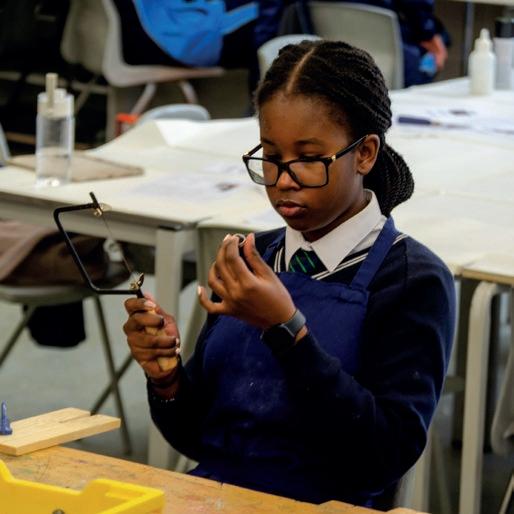
In the Autumn and early Spring terms, students explore architecture and CAD simulation. They research, plan, and communicate ideas through drawing, AI simulation, and accurate scale-modelling techniques.
In the late Spring and early Summer terms, students develop knowledge and skills in working with metal. They design and manufacture a product to raise awareness for the World Wildlife Fund. This involves research-led design, mouldmaking, metal casting, and developing graphic design skills to package and promote their item.
In the late Summer term, students investigate the design and development of flying machines through collaborative research, modelling, and presentation activities.
In the Autumn term, students build advanced skills in working with metals, including copper, aluminium, and pewter, to create a distinctive, nature-inspired piece of jewellery. They also explore enamelling, resin work, and CAD simulation for jewellery design.
In the Spring term, students extend their CAD and manufacturing techniques to create an original inlaid jewellery box inspired by a chosen design movement.
In the summer term, students are introduced to computeraided 3D design and additive manufacturing, enabling them to design and test ergonomic 3D-printed prototypes
The Design and Technology department offers co-curricular clubs for students in Years 7 to 9 and at GCSE level. These clubs provide valuable opportunities for students to gain a deeper understanding of the tools, processes, and techniques used in the Design and Technology workshop.
The Years 7 to 9 club will focus on introducing students to the fundamentals of workshop practice, while the GCSE club will support Design and Technology students who wish to further develop their skills.
When designing, students will develop essential skills that enable them to create thoughtful, original, and functional products. They will learn to:
• collect research to inspire and inform their designs
• create clear and specific design requirements to ensure products are both fit for purpose and visually appealing
• use a variety of approaches to generate creative and innovative ideas
• develop and communicate their design concepts effectively through annotated sketches and detailed plans
When making, students will develop essential skills that enable them to bring their designs to life. They will learn to:
• Select and use specialist tools, techniques, processes, equipment, and machinery with precision, including computer-aided manufacturing
• Choose appropriate materials based on their properties and suitability for the task
When evaluating, students will develop essential skills that enable them to critically assess and improve their work. They will learn to:
• Test, evaluate, and refine their ideas and products against their original specifications, incorporating feedback from others
• Analyse and evaluate their own work alongside that of past and present professionals to deepen and broaden their understanding
Head of English:
Mr D Woodhouse
Reading is central to the study of English, and students are encouraged to read widely, selecting both fiction and nonfiction texts that provide an appropriate level of challenge, both in class and independently. In English lessons, students are invited to share their own experiences and opinions during discussions on a variety of issues raised by the texts studied. The curriculum is designed around engaging units that explore a range of debates, both topical and timeless. Through this approach, students will develop greater confidence as readers and speakers, gaining a strong understanding of functional, transactional, and literary language.
Student will begin with a unit on autobiography, informed by the study of selected autobiographical texts such as Cider with Rosie and Unbelievable. The second unit introduces Shakespeare’s villains, exploring characters from plays such as Richard III and Much Ado About Nothing. This is followed by a prose study of a modern novel, before moving on to a poetry unit focused on different identities and cultures. The year concludes with an exploration of the impact of media, where students undertake a project to design and present their own product to their peers.
Students will begin with the study of a Victorian novel, introducing them to the themes and concerns of writers such as Charles Dickens and Charlotte Brontë. A second unit on Gothic writing follows, encouraging students to apply genre conventions in their own creative work. After this, students will examine the presentation of nature in poetry across literary history, from the medieval period to the 21st century. The year concludes with an interactive study of The Tempest, exploring its characters, context, and themes.
The curriculum is designed to prepare students for the demands of GCSE study. The year begins with the exploration of modern drama, studying texts such as Journey’s End or A Raisin in the Sun, with a focus on contextual analysis. Students then engage with a prose study of a political novel such as Animal Farm or Lord of the Flies, alongside developing persuasive writing skills. This is followed by a directed writing unit, which familiarises students with non-fiction genres and hones their understanding of media bias. The year concludes with a study of 21st-century poetry, designed to refine both creative and analytical writing skills.
Each year, the English department organises a range of theatre trips to see plays in performance, as well as cinema visits to experience literary adaptations on screen. Weekly sessions are available for subject support, alongside a Creative Writing Club, a school Newspaper Society, and other student-led initiatives. The department works closely with the library to host numerous visiting author events throughout the year and runs a popular book award shadowing programme, encouraging students to engage with contemporary literature.
English in Years 7 to 9 is taught through half-termly units of work, each focusing on an overarching skillset or text. Units are designed to develop either reading or writing skills, and each year has an overall theme that links the units together. Formal, graded assessments take place twice per half term, with the main assessment being of substantial length. The penultimate half term is assessed through a formal examination. Across the three years, we focus on the key skill areas of analytical reading, essay writing, creative writing, writing in non-fiction genres, and speaking, including presentation, debate, and role-play.
Joint Heads of EAL:
Mr C Forte & Mrs S Howson
If English is not a student’s first language, the EAL Department provides tailored support to help them achieve their full potential across the wider curriculum. A specialist EAL teacher works closely with students to develop their English language skills, encouraging independent learning habits alongside building confidence in the four key areas of Speaking, Listening, Reading, and Writing.
In addition to timetabled English language support (which may replace a Modern Foreign Language or Latin), private weekly lessons are available on an individual or small-group basis. Many students choose to take these sessions to further enhance their proficiency in English. In some cases, students for whom English is an additional language may be required to take these lessons as a condition of their offer; if so, this will be clearly outlined in their offer letter.
The EAL Department supports students in developing their English language skills, enabling them to access the full school curriculum with confidence. EAL classes are offered as an alternative to studying a Modern Foreign Language or Latin and are taught by a specialist EAL teacher. These lessons focus on strengthening proficiency in the four key areas of Speaking, Listening, Reading, and Writing.
Students also build essential foundation skills to support their wider academic studies, including punctuation, grammar, essay writing, and the use of academic vocabulary. A range of fiction and non-fiction texts is used to enhance comprehension and engagement, and students have access to an extensive selection of grammar and vocabulary resources provided by the EAL Department.
The EAL provision continues to be delivered by a specialist EAL teacher and is offered as an alternative to studying a Modern Foreign Language or Latin. It provides students with the opportunity to extend and develop their skills in Speaking, Listening, Reading, and Writing, ensuring they can engage fully with the wider curriculum.
The EAL Department offers a dedicated class as an alternative to one or both Modern Foreign Languages, or Latin. This provides students with the opportunity to further develop their skills in the four key areas of Speaking, Listening, Reading, and Writing.
Students explore more advanced fiction and non-fiction texts from a wide range of sources, strengthening their English language proficiency to ensure they can achieve their full potential across the wider curriculum.
In addition, students have the opportunity to prepare for the Cambridge English First Certificate (FCE), an internationally recognised English language qualification.
An individual EAL lesson with a specialist teacher from the EAL Department offers a personalised teaching programme, carefully tailored to meet each student’s specific learning needs. Language and learning targets are set and reviewed on a termly basis in collaboration with the teacher.
This individualised support not only strengthens English language proficiency but also helps students develop the academic and subject-specific vocabulary needed to succeed across the wider curriculum. Many students find these lessons invaluable for improving their overall English ability and gaining the confidence to access their other academic subjects effectively. This support is particularly important in Year 9, ensuring students are fully prepared to begin their GCSE courses with confidence.
MFL/Head of French:
Mr Julien Sampieri
The study of modern foreign languages from Years 7 to 9 plays a vital role in developing students’ communication skills, critical thinking, and cultural awareness. It provides unique insights into other societies and cultures that can only be fully appreciated through the study of their languages, enriching students’ lives and broadening their horizons.
The programme is designed to build on prior language learning and cultural knowledge in an interactive, communicative, and intellectually stimulating way. Through this approach, students develop confidence and competence in the four key skills of listening, reading, speaking, and writing across at least two foreign languages. By the end of Year 9, they are equipped with a strong foundation to embark on GCSE studies and beyond.
Year 7
Student will embark on their modern foreign language journey by developing essential linguistic skills and building a solid foundation in grammar and vocabulary. They are introduced to key topics and begin to express themselves confidently in their new language.
• Greetings and introductions
• Numbers 1–31, age, birthdays, and dates
• The alphabet and pronunciation
• Consolidation of core vocabulary
• Physical descriptions using adjectives
• Introduction to the verb avoir (to have)
• End-of-term assessment to determine language sets
• Introduction to the verb être (to be)
• Describing personality with adjectives
• Vocabulary for family members
• School subjects and opinions
• Expressing preferences and giving reasons

Student start focusing on consolidating prior learning and expanding students’ ability to communicate about familiar topics with greater complexity. They begin to use a wider range of verbs and tenses while exploring new cultural contexts.
• Revision of school subjects
• Clothing vocabulary: school uniform and weekend attire
• Comparative forms for descriptions
• School routines using regular -ER verbs
• Hobbies with the verbs jouer and faire
• Introduction to two-verb constructions
• Describing places in town; using il y a and il n’y a pas de
• Introduction of the verb aller (to go) + places
• Giving opinions and reasons
• Planning a visit to Paris using the near future tense
• Consolidating the near future in combination with the present tense
• Revision for Roedean’s summer assessment
Students start preparing for GCSE-level work by strengthening their grammatical understanding and enabling them to express themselves across past, present, and future contexts. They gain confidence in discussing more sophisticated topics and using complex structures.
• Revision of être (to be) and avoir (to have) to talk about school holidays
• Using the past tense with regular verbs to describe past holidays
• Describing visits to a theme park with some irregular verbs
• Aller in the past tense; introduction to negative forms
• Talking about festivals and celebrations in France using regular -ir and -re verbs
• Planning future trips using the near future tense
• Discussing French celebrities and television programmes
• Digital technology; forming questions in French
• Talking about leisure activities and sports across three tenses
• Giving opinions about sports and healthy living
National competition such as Poesiae, Linguistic Olympiads, Language spelling bees.
By the end of Year 9, students will understand and respond to spoken and written language drawn from a variety of authentic sources. They will speak with increasing confidence, fluency, and spontaneity, effectively communicating their ideas through discussion, asking questions, and continually refining their pronunciation and intonation. Their writing skills will develop to produce texts of varying length for different purposes and audiences, utilising a broad range of grammatical structures and tenses acquired throughout their studies. Additionally, students will cultivate an appreciation for diverse styles of writing in the language studied, deepening their cultural and literary understanding.
Head of Geography:
Mr G Carter
Geography in Years 7 to 9 enables students to explore and discover a wide variety of both physical and human topics. The focus is on fostering a genuine interest in the world around them while providing exciting and stimulating learning experiences. Throughout Years 7 to 9, students develop the essential skills and knowledge required to succeed in GCSE Geography and beyond.
Our World: The World Around Us Students are introduced to the diverse facets of Geography, beginning with an overview of the subject before exploring the planet from a geographer’s perspective. They seek to understand the links, connections, and conflicts that shape our world.
The Autumn term focuses on ‘Global Scale’ Geography, covering continents, biomes, population distribution and change, climate patterns, and the use of latitude and longitude.
During the Spring term, the focus narrows to a ‘National Scale’ with studies on the physical features of the British Isles, urban change within the UK, the geopolitics of Brexit, and the Commonwealth.
The Summer term explores ‘Local Scale’ Geography, concentrating on the Southeast as an economic hub, the county of Sussex, coastal geomorphology, and the urban resurgence of Brighton & Hove.
Throughout Year 7, students develop essential skills in interpreting graphs, maps, and diagrams, known as graphicacy, to prepare them for more advanced study in the years ahead.

Our World: Our Place in the World Building on the graphicacy skills developed in Year 7, Year 8 students delve into three key themes of physical and human geography: plate tectonics, socio-economic development, and sustainability.
• ‘The Restless Earth’, studying the Earth’s structure, plate tectonic theory, volcanoes, earthquakes, and natural hazard management
• ‘The Global Fashion Industry’, examining development, trade, industry, fast fashion, production chains, and globalisation
• Sustainability issues such as clean energy, waste recycling, consumerism, resource management, and the enhanced greenhouse effect
Throughout Year 8, students are introduced to global systems and explore how humans interact with the environment, sometimes sustainably, but often with significant environmental consequences.
Students begin the GCSE Geography topic The Living World, which covers key aspects of biogeography including ecosystems, biodiversity, interdependence, and adaptation. They then apply these concepts to the study of two biomes: polar environments and tropical rainforests, using case studies of Svalbard (Norway) and Amazonia (Brazil).
Towards the end of Year 9, students spend several weeks examining the evidence, causes, and potential mitigation strategies related to climate change. This study builds directly on their earlier exploration of two particularly fragile and extreme global ecosystems.
Starting the GCSE course in Year 9 offers both academic stretch and challenge, allowing young geographers to explore The Living World in greater depth. Since the AQA GCSE syllabus is typically taught over two years, beginning the course earlier prevents content from being rushed and enhances students’ understanding and enjoyment.
By the end of Year 9, students are well-prepared to make an informed decision about choosing Geography as a GCSE subject for Year 10 and beyond.
To enhance learning beyond the classroom, Year 9 Geography offers a range of enrichment opportunities that allow students to engage practically with the subject and develop their geographical skills and interests.
• Roedean Geographical Society
• Trip to the beach (East and West sides of Brighton Marina)
• Microclimates study of the Roedean environment
Throughout Years 7 to 9, students build a diverse set of essential geographical skills that prepare them for further study and real-world applications.
• A wide range of graphicacy skills
• Map interpretation skills
• Evaluation skills
• Extended writing skills
• Analytical skills
Enrichment Co-ordinator:
Miss F Kelsey
HHH stands for ‘Head, Heart and Hands’ and is designed as a stimulating and relevant programme that extends learning beyond the traditional academic curriculum. It nurtures students’ curiosity and develops skills across three dimensions: mentally (‘Head’), emotionally (‘Heart’), and physically (‘Hands’). The well-rounded experiences gained throughout Years 7, 8, and 9 equip students with a broad range of valuable skills to carry forward into their future endeavours.
Year 7 and 8 Curriculum
Students will participate n a carousel programme consisting of five different activities. The will spend a total of six weeks doing each activity, having one lesson per week.
• Careers
• BSL
• Textiles
• Coding
• Self-Defence

9
Students will participate in a carousel programme consisting of seven different activities. They will spend a total of five weeks doing each activity, having one lesson per week.
• BSL
• Russian
• AI & Media Literacy
• Public Speaking & Debate
• Cooking
• Textiles
• Ceramics & Sculpture
•
There are no specific trips, clubs, or events organised through the HHH programme; however, many of the activities offered are also available during lunchtime and after-school activity slots. This allows students who wish to further develop skills or interests explored in HHH to continue progressing beyond the scheduled sessions.
The wide range of skills developed through the HHH programme is extensive and includes teamwork, communication, research, problem-solving, creative thinking, and many more. The information below outlines the key skill areas that underpin HHH:
• Head: Cognitive knowledge and professional skills – to know, think, and understand
• Heart: Emotional and spiritual learning, personal skills –to love, appreciate, and belong
• Hand: Practical and physical skills – to contribute, create, and lead

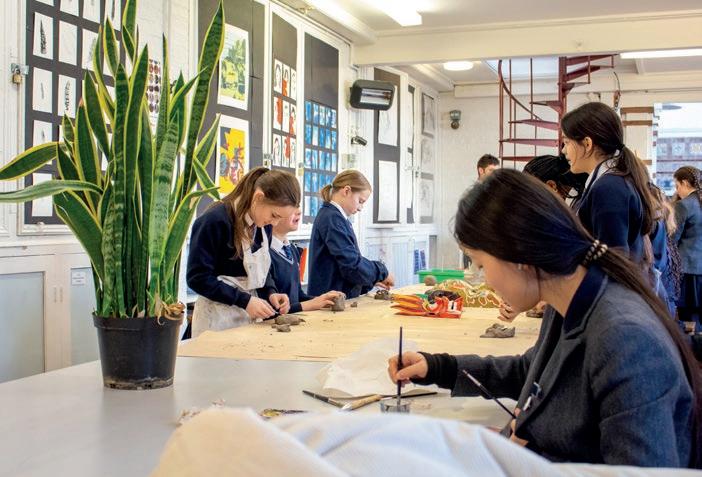

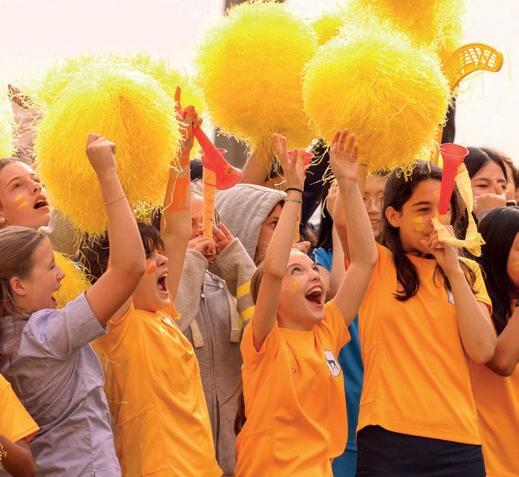
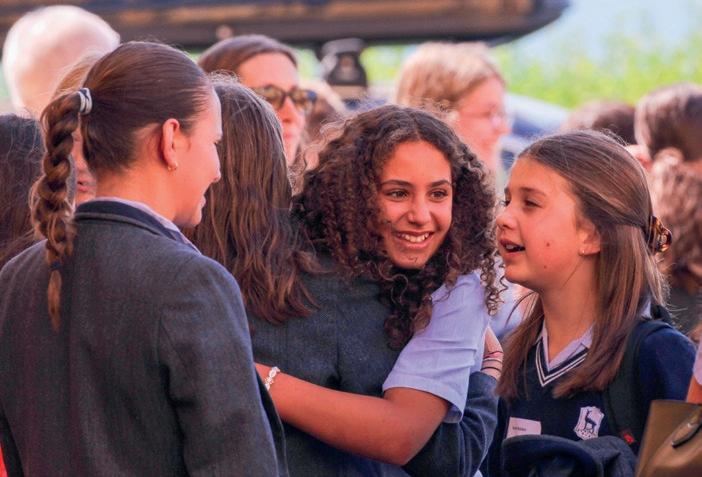
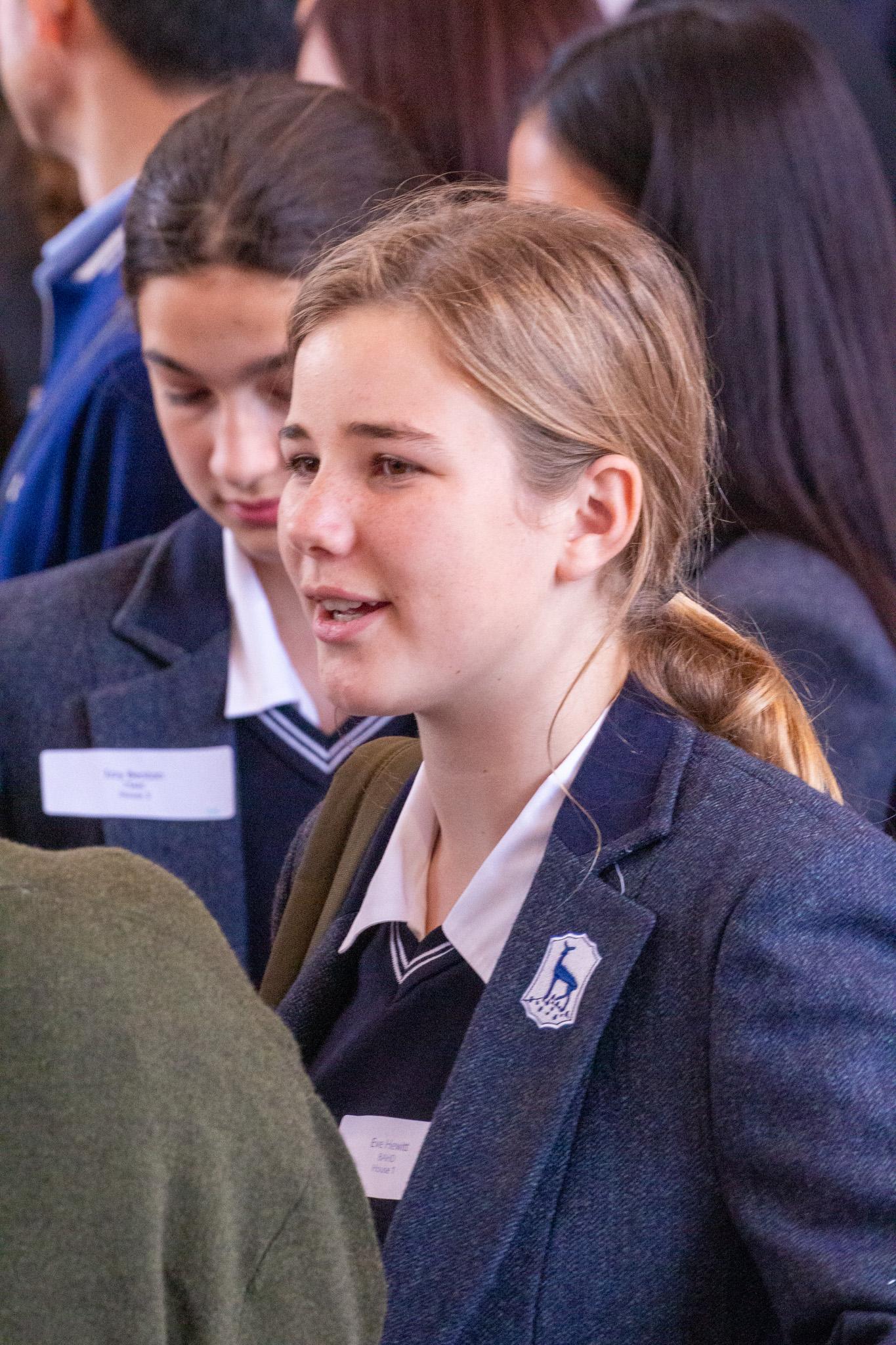
Ms G Benton-Stace
Studying History at Roedean equips students with skills that extend beyond the study of the past. The ability to analyse and prioritise information is essential for effective decisionmaking and valuable across many careers. Understanding current affairs and engaging meaningfully in discussions requires knowledge of history, as contemporary events are shaped by what has come before.
By examining the histories of different cultures, students develop insight into why people behave as they do. They explore human history and observe recurring patterns, such as the rise of charismatic dictators like Stalin, Mussolini, and Hitler, or the role of religion in conflict. History reveals how humans often overlook key factors that contribute to war and oppression. It is the responsibility of historians to identify past mistakes, reflect on them, and ultimately help prevent their repetition in the future.
Year 7
Students will explore the Medieval World (1066-1500)
• How did William gain control of England?
• What was remarkable about the Islamic Empires?
• Who held power in the Middle Ages?
• What was the impact of the Black Death on England?
• Why was the Song Dynasty a 'golden age'?

Students will explore more about the life in England from 1500-1750
• How did religion change under the Tudors?
• How radical was the 17th century?
• What was the experience of the British Empire for those living in it?
• How did the Trans Atlantic slave trade develop and decline?
• How different was decolinisation?
9
Students will explore more about the 20th Century World
• How did people experience WW1? How did life change under Communism in Russia?
• How did WW2 impact people's lives?
• How did black people fight for rights in the USA and UK?
• What is black British history
The History curriculum is enriched by a range of trips and special events that bring the past to life and deepen students’ understanding of key historical periods.
• Year 7: Trip to Battle Abbey and the location of the Battle of Hastings, along with a visit to a local castle
• Year 8: Visit to Hever Castle and/or Hampton Court, complemented by regular lectures on a variety of historical themes
• Year 9: Living History Presentation on the First World War, visit to the battlefields of the First World War including Ypres and the Somme, and a visit and talk from a Holocaust survivor
History at Roedean develops a wide range of essential skills, including chronology, source analysis and evaluation, and the ability to select relevant and reliable historical evidence. Students learn to interpret causation, develop explanations, test hypotheses, and make informed historical judgements. The curriculum also emphasises understanding the significance of events such as the Holocaust and the Middle Ages, fostering skills in analysis, historical interpretation, and note-taking. Additionally, students build strong written skills through structured paragraph writing, effective use of sources, and examination preparation.
Head of computing:
Mrs K Griffiths
ICT is a creative and empowering subject that combines the academic discipline of Computer Science with practical skills in Information and Communication Technology, alongside an understanding of the societal context of internet and technology use.
At Roedean, ICT is highly practical. While students explore the underlying concepts and theories, the primary focus is on creating real-world end products. Students design and build apps, websites, and games, learning how these interact with the internet and the Internet of Things. They also develop skills in spreadsheets, image editing, and other software applications, applying these techniques to practical scenarios. The subject encourages the integration of technology across the curriculum, enabling students to apply their ICT knowledge in other subjects and prepare for the increasingly digital world of the future.
Year 7
Students begin their ICT journey by building essential digital skills and understanding key concepts that form the foundation of computing. The curriculum covers a range of practical and theoretical topics designed to develop confidence and competence in technology use, problemsolving, and digital creativity, including:
• Practical information about the school network and email system.
• eSafety and assessing the reliability of online sources.
• Computational Thinking – Approaches to problem solving using abstraction, decomposition, and algorithmic thinking.
• The concept of algorithms and the fundamentals of algorithm design, applied through block-based coding, with some students exploring text-based programming.
• Spreadsheets – Researching, manipulating, analysing, and presenting data.
• Images – Principles and practice of digital image creation, manipulation, and storage.
• Programming Physical Devices – Creating and programming devices such as a compass and a step counter.
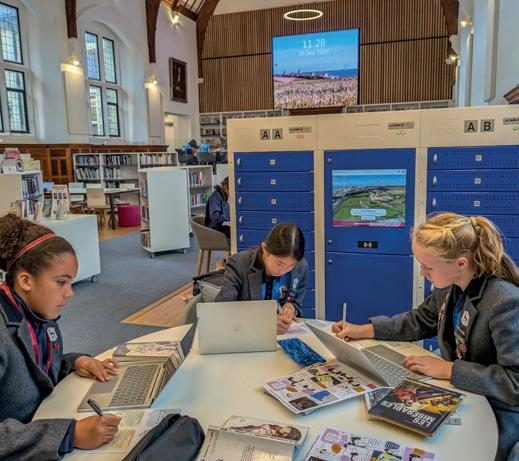
Students deepen their understanding of ICT through a blend of creative and technical skills.
• Media animation – Discovery of how professionals create 3D animations using the industry-standard software package, Blender. Understand the importance of this creative field and how it is used to make the media products that we consume. Develop skills through the basics of modelling, texturing, and animating.
• Computational Thinking – Approaches to problem solving using abstraction, decomposition and algorithmic thinking.
• Text-based programming with Python – Build on the skills developed in Year 7 to create simple programs involving input and output, and gradually moves on through arithmetic operations, randomness, selection, and iteration.
• Data representation – Understand what binary digits are by associating them with familiar sets of symbols such as letters and decimal digits. Solve simple problems that reinforce the connection between (alphanumeric) information and its binary representation. Consider the question of why binary digits are predominantly used in conjunction with computing systems.
9
Students advance their ICT knowledge by focusing on more complex concepts and applications.
• Computational Thinking – Approaches to problem solving.
• Algorithms – Understanding how algorithms allow a computer to sort data and search within data and how computers can simulate intelligence.
• AI – Understand the origin and uses of AI and how rules are used in its decision making. Discuss the simple ethical hypothetical problems and understand how intelligence can be measured in humans and computers.
• Cybersecurity – Understanding some of the ways in which data can be compromised on the internet.
• Images – Principles and practice of digital image creation, manipulation and storage using Photoshop or other software.
To enrich their learning beyond the classroom, students can participate in a variety of ICT-related activities and events. These include:
• Coding club
• Digital Day
• Bebras International Computational Thinking Challenge
• Cyberfirst Girls Competition
• Perse Coding Challenge
• Cyber Explorers
• Safer Internet Day
At the heart of ICT is problem solving through understanding and applying the potential of technology. Students will practice computational thinking skills, including decomposition (breaking a problem into smaller problems) and algorithm design. They will develop skills in specific software and programming languages and through these will develop general transferable skills in using and programming software and hardware.
Mrs J Hopper & Mr A Lutwyche
Through the study of Mathematics, students are encouraged to foster rational thinking and develop an appreciation for the beauty of the natural world. The curriculum promotes intellectual curiosity and equips learners with the skills needed to be critical observers and problem solvers. It encourages experimentation with new ideas, pattern recognition, and logical reasoning through complex situations, all within a supportive and positive environment where all ideas are valued, and mistakes are embraced as essential steps toward deeper understanding.
When students join Roedean in Year 7, they come with varying levels of knowledge and experience in Mathematics. The first part of the year is dedicated to ensuring that all students start from a level playing field, enabling them to work together and engage with new material confidently. This is achieved through a blend of problemsolving activities, traditional teaching methods, and other classroom-based tasks.
In Year 7, students can expect to encounter a broad spectrum of mathematical concepts, ranging from foundational topics to some IGCSE-level material, depending on their progress. The curriculum covers all key areas, including number, algebra, data, and geometry. Lessons are carefully scaffolded to ensure accessibility for everyone. Year 7 Mathematics aims not only to enthuse students but also to support their academic progression. It is often the first year students use calculators regularly. From the outset, students are set by ability, and frequent lowstakes assessments help ensure they receive the appropriate level of challenge for each individual student, be that via a set move or a variety of challenging class activities.
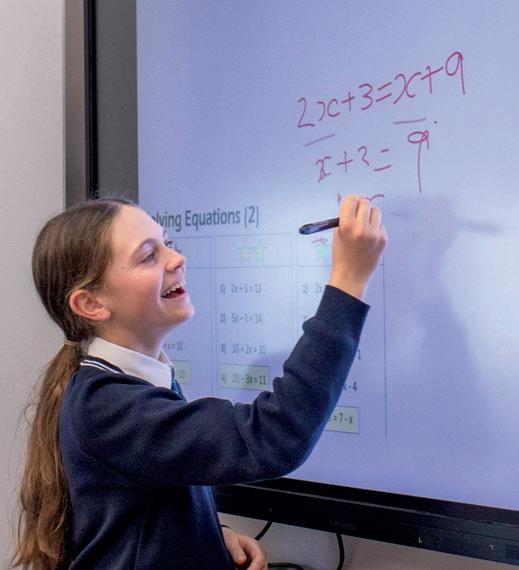
Each year in Mathematics builds on the progress made in the previous year, so a consistent approach is maintained throughout Years 7 to 9. Students are introduced to more advanced topics such as algebra, transformations, and mathematical concepts like Pythagoras’ theorem. Regular low-stakes assessments help them become familiar with the types of questions they will encounter in the future and encourage independent learning. Problem solving remains a key focus, with tasks designed to promote discussion, sharing of methods, and deeper understanding. Over time, students’ confidence as mathematicians grows, alongside their ability and willingness to explain mathematical concepts clearly.
Students begin to develop the confidence to attempt any question and the ability to break down complex problems into smaller, manageable parts, rather than tackling one large, complicated task all at once.
Problem solving continues to be a central focus in lessons; however, students no longer require scaffolding, as they can independently deconstruct problems.
Although GCSE-level topics will have been introduced in earlier years, Year 9 marks the official start of the IGCSE course. New topics covered include trigonometry, quadratic equations, and loci. Students emerge as confident mathematicians who are willing to share their thinking with the class, regardless of whether they are certain of the answer.
Students participate annually in the Maths Challenge and the Team Challenge, both of which have resulted in significant successes. There is also the Maths Feast where we regularly take a team or two, each containing four students. Some of the highest-achieving Year 9 students may have the opportunity to attend a weekend Masterclass course at Sussex University. Additionally, Maths drop-in clinics are available daily during break times and certain activity sessions, including dedicated preparation sessions for the Maths Challenges.
The GCSE and A-Level curricula are becoming increasingly problem-based, often presenting questions in real-life contexts. The skills developed throughout the Year 7 to 9 courses are designed to enhance students’ abilities in these areas, helping them see mathematics not as a collection of isolated ideas, but as a set of interwoven tools to solve a wide range of problems. This approach encourages the use of varied techniques and methods to tackle challenging questions.
The Mathematics department focuses on fostering a classroom environment where students feel confident to attempt any question, embrace the possibility of making mistakes, and adapt their strategies to move closer to the correct solution. This builds resilience and confidence, enabling students to engage with problems fearlessly and deepen their mathematical understanding. Students should develop the ability to use skills they covered in the previous years and apply them to more contextual problems, using regular modelling, and questioning techniques from their teachers to help them achieve any given goal. Each half term covers different areas: starting with ‘Number’, then ‘Algebra’, followed by ‘Geometry’, returning to ‘Number and Algebra’, then ‘Geometry’ again, and concluding the year with ‘Data’. At Roedean, Mathematics classrooms are supportive spaces where everyone is encouraged to share their methods and opinions, regardless of whether they are certain of their correctness.
Director of Music:
Mr
B Rous
Music at Roedean is lively, engaging, and inclusive. All students in Years 7 to 9 study Music as part of the standard curriculum. Projects are designed for all students, not just those who already play an instrument, and include a wide range of differentiation. The curricular work in music lessons is enhanced through the provision of music workshops for all students.
The Music curriculum focuses on building confidence in understanding the core musical elements: timbre, dynamics, duration, pulse, metre, pitch, melody, tonality, harmony, texture, and structure, and on developing the musical skills of listening, creating, and performing. Enquiry-based learning frames every topic with questions designed to spark curiosity and make the areas of study relevant, such as ‘Is improvising really improvising?’, ‘Are all notes equally important?’, and ‘Why does music make us dance?’.
This is coupled with a strong focus on practical experience, with students learning by being musicians and making music, thereby developing and honing their musical skills. This approach builds confidence, expression, and a deeper understanding of the subject. Just as at GCSE, all students undertake performance and/or composition courseworkstyle projects as part of their end-of-year assessments for Music.
Curriculum Overview
Year 7
The curriculum is designed to give all students a strong foundation in practical musicianship, creativity, and listening skills, regardless of their prior musical experience.
Performing – We believe all students are musical and can develop their musical skills. In Year 7 all students learn to play an orchestral instrument (from trumpet, trombone, violin, viola, clarinet, and bassoon) as part of the Instrumental Project. Fundamental musicianship is developed through singing, apprehension of pitch via solfa, and pulse and rhythm using Kodály rhythm syllables. All students perform as part of groups and whole-class ensembles using electronic keyboards, tuned percussion, and ukuleles. The whole year group forms a choir and performs
in the Carol Service, and the Instrumental Programme culminates with a concert performance in the summer term.
Creating – Music is a craft, and students are taught the core principles of creating musical patterns and gestures, beginning to control elements such as consonance and dissonance, rhythm, dynamics, repetition, phrase, melodic contour, and texture. Models are taken from folk music and famous pieces that use storytelling, such as Peter and the Wolf. Students are introduced to using GarageBand to record and manipulate their ideas.
Listening – Listening skills are developed in all units of work. Dictation of both pitch and rhythm is developed via musicianship work, and there are regular listening homework tasks reinforcing the ability to identify elemental features such as instrumental timbres, tempo, dynamics, metre, tonality, and pitch.
Some sample topics for Year 7 are: Musicianship, Singing, Pentatonic, GarageBand Skills, Peter and the Wolf, Ukuleles.
The curriculum expands on the skills and confidence developed in Year 7, encouraging students to deepen their practical, creative, and analytical engagement with music.
Performing – Some students will continue to study their instrument from the Instrumental Project. In the classroom, students use tuned percussion to explore improvisation, learning and performing jazz tunes and recording extended improvised solos. They also have opportunities to perform Afro-Cuban music, including typical percussion parts and rhythms, to sing and play famous classical melodies on electronic keyboards, and to participate in whole-class Samba band performances.
Creating – Students build on the skills learnt in Year 7, developing their understanding and application of compositional devices such as phrase, motif, sequence, extension, drones and pedals, ostinato, core rhythms, imitation, call and response, and polyrhythmic textures through projects on improvisation and Afro-Cuban music. The project on Variations uses staff notation software to explore variation techniques and the handling of harmony and non-harmony notes. Mood and Music, inspired by Mussorgsky’s Pictures at an Exhibition, gives students the opportunity for group composition. At every stage, the
focus is on developing understanding and control of musical elements to build confidence in creating well-crafted musical material.
Listening – All projects use real musical examples as models, and homework tasks include listening questions designed to build confidence in the aural identification of musical elements and styles. Students hear examples from contemporary artists as well as historic masterworks, providing both inspiration and context.
The curriculum consolidates and extends the skills developed in Years 7 and 8, preparing students for the increased independence and creativity required at GCSE level. It focuses on refining performance, deepening compositional techniques, and broadening listening skills through a wide variety of musical styles and contexts.
Performing: Some students will continue to study their instrument from the Instrumental Project, possibly beginning to reach intermediate to advanced grades. In the classroom, all students explore keyboard performance in the Tonalities topic, refining and recording a performance. During the songwriting work and when using production software, students are encouraged to perform the parts they are writing and recording, using keyboard, guitar, and bass. All students submit a performance as part of their final assessment.
Creating: The level of focus deepens, and students use GarageBand and/or Sibelius software on a variety of projects involving musical composition. Building on skills from Years 7 and 8, students cover two large projects on production and composition techniques. Part 1 explores textures, beats, drones, ostinatos and riffs, with exemplars from pop and electronic music, minimalism, and film music. Part 2 explores chords, melody, and song structures, applying the use of stock chord progressions in songwriting. Staff notation is revisited in the Waltz unit, with a strong focus on melodic invention. The year, and KS3 course, ends with a short remixing project, with a prize for the most inventive creation.
Listening: Listening is embedded into each project, with a wide range of musical exemplars chosen to inspire and broaden students’ contextual understanding. Listening activities are linked to specific techniques that can be applied in composition and performance practice.
Sample topics at Year 9: Production and Composition Techniques (Parts 1 and 2), Waltz, Tonalities, Remixing
We encourage musicians of all ages to enjoy performing and to develop their individual talents to a high standard, both as soloists and as members of choirs, vocal groups, orchestras, bands, and chamber ensembles. There is an extensive range of musical activities on offer, ensuring that there is something for everyone to enjoy, including visits to professional concerts in Brighton and beyond. Weekly activities are complemented by termly recitals and masterclasses with visiting professional musicians. Roedean students perform frequently, both in and outside the school, in a wide range of exciting and high-profile concerts and recitals. These performances draw large audiences and continue to maintain their highly regarded reputation.
Through the study of Music, students develop a wide range of practical and intellectual skills that extend far beyond the classroom. They gain the ability to play an orchestral instrument, alongside core skills in keyboard and ukulele, and grow confident in their sense of pitch, pulse, and rhythm. Students strengthen their inner hearing and aural awareness, enabling them to identify and notate rhythms and pitches accurately through dictation. Singing skills and ensemble work build their confidence to perform and listen actively to those around them, fostering teamwork and collaboration. They also develop creative skills through improvisation and composition, supported by an understanding of how musical elements interact. Alongside this, students acquire the ability to speak clearly and analytically about music, reflect critically on their own and others’ work, and apply effective practice methods such as chunking and deliberate repetition. Music technology plays a vital role, with students learning to use a range of production software and gaining transferable ICT skills relevant to modern music-making.
Head of Personal Development:
Mrs J Chamberlain
The PSHE curriculum is an exciting programme designed to provide students with the knowledge, skills, and confidence to thrive both in the school environment and beyond. They explore a range of relevant, age-appropriate topics with opportunities for discussion and reflection. All PSHE lessons are delivered by highly qualified teachers in a positive, supportive atmosphere that encourages intellectual curiosity. Clear ground rules are agreed by students and their teacher at the start of the year to ensure a comfortable and relaxed environment. Any queries relating to the PSHE curriculum can be directed to the Head of Year.
Students do not attend specific trips or visits as part of the PSHE syllabus, but they have the opportunity to listen to a range of outside speakers invited into school to provide an added dimension to the topics covered. These talks may address particularly topical issues such as ethical consumerism, drugs education, and staying safe online. Additionally, our regular trips programme, including year group residentials, supports students in developing positive relationships, communication skills, resilience, personal hygiene, and independence.
Students will begin their journey at Roedean by exploring the transition to secondary school and learning how to stay safe both in and out of school, including essential first aid skills. They are introduced to the school’s culture of mutual respect, understanding how to recognise discrimination and build inclusive friendships. Through topics on community and diversity, students explore British Values and the importance of belonging. Health and puberty lessons provide guidance on healthy routines, body changes, and staying safe from unwanted contact, including learning about FGM. As the year progresses, students develop key revision strategies to prepare for assessments. Finally, they explore the diversity of families and what makes relationships respectful and healthy, laying strong foundations for the years ahead.
Students will be encouraged to think critically and make informed choices as they take on new responsibilities. They learn essential financial skills, including budgeting, saving, and making wise borrowing decisions. Discussions around drugs and alcohol focus on peer pressure, misuse, and the broader impact on health and society, including links to crime. In sex and relationships education, students explore the role of the media, sexting, grooming, and consent— promoting respectful and informed choices. They also reflect on ambition and aspiration while considering equality in careers and future pathways. A continued emphasis on a culture of mutual respect reinforces their understanding of discrimination. Finally, an introduction to politics develops their awareness of the UK and US systems, the power of voting, and the history of women’s suffrage.
Year 9 PSHE at Roedean empowers students to navigate the challenges of modern society with knowledge and integrity. Students explore critical topics including gangs, poverty, knife crime, fake news, extremism, and radicalisation, developing awareness and resilience. They examine healthy lifestyles through balanced diet, sleep, exercise, and self-examination, while learning about illness prevention and oral health. Intimate relationships are explored with sensitivity, covering consent, contraception, abstinence, safe sex, and the impact of pornography and harassment. Students reflect on their personal strengths and aspirations, investigating careers, university pathways, and employability skills. A strong culture of mutual respect underpins all learning, encouraging understanding of discrimination. Finally, students build effective study habits and revision strategies in preparation for the academic demands of GCSE courses.
PSHE at Roedean is an essential part of the Year 7 to 9 journey, equipping students with the knowledge, confidence, and values needed to navigate an ever-changing world. Through engaging lessons on health, relationships, personal safety, respect, and global issues, students develop emotional intelligence, resilience, and a strong moral compass. From exploring diversity and mutual respect to considering careers and preparing for exams, PSHE lays the foundation for thoughtful, compassionate individuals.
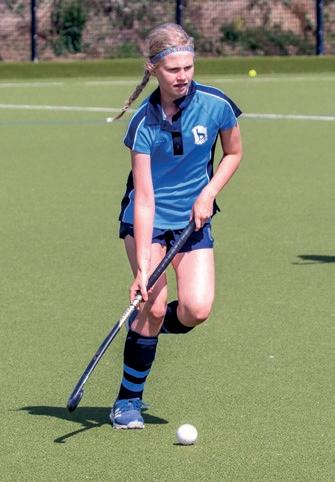

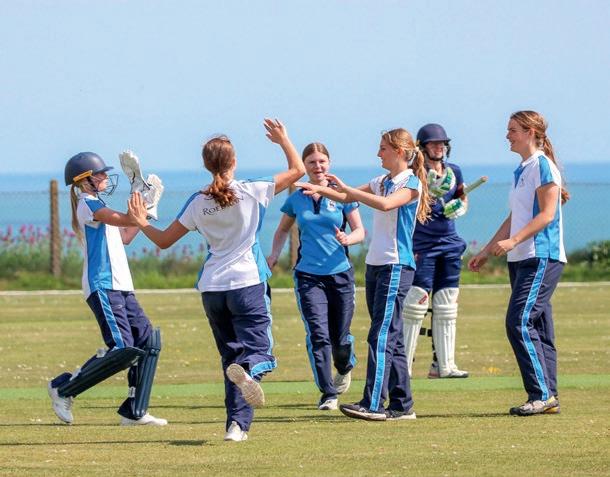
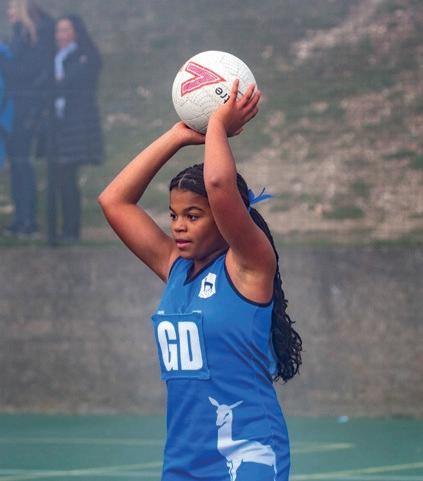
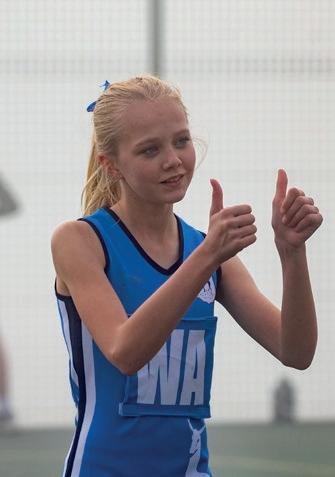
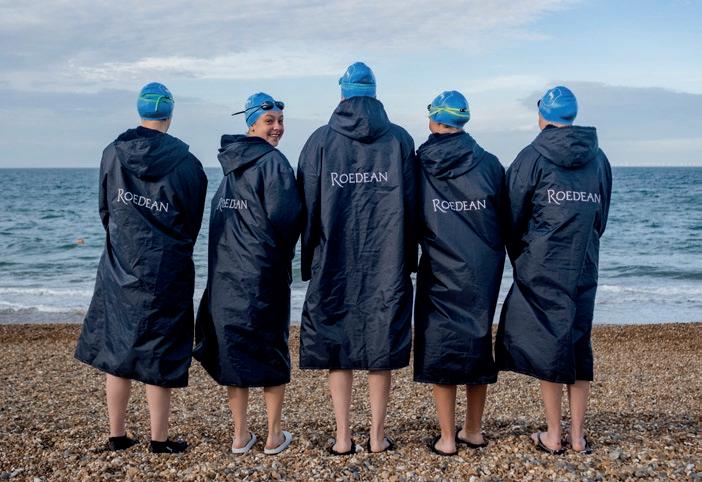
Head of Religion and Philosophy:
Mr S Megahey
Religion and Philosophy at Roedean offers students the opportunity to explore the major faiths alongside the philosophical and ethical questions that arise for all people. All students in Years 7 to 9 study Religion and Philosophy as part of the standard curriculum. Lessons emphasize evaluative exploration of different religions, belief systems, concepts, and practices. Students of all faiths and none are encouraged to express and reflect on their own beliefs as well as those of others.
Students will begin with an exploration of ancient myths and the ways in which early peoples sought to answer ultimate questions. They will then study the six major world faiths through various themes, examining how religious communities celebrate festivals and feasts, and observe fasts. Students will consider how a contemporary, multi-faith society responds to these holy days, and will have the opportunity to research festivals, feasts, and fasts independently, presenting their findings to the class. In the spring term, students will investigate the purpose, features, and significance of holy buildings, analysing their importance and engaging in creative activities to deepen their understanding. During the summer term, the focus will shift to how religion is expressed through the Arts and what artistic expression reveals about faith, community, and God. Students will also become familiar with holy books and their role in the lives of religious people. Throughout the course, students are encouraged to share ideas, raise questions, and engage in meaningful discussions.
Students will begin the course by exploring the concept of God, examining perspectives from the six major world faiths. They will compare, contrast, and synthesise these views to develop a broad understanding. The course will then investigate historical theological arguments both for and against the existence of God, encouraging students to critically evaluate their effectiveness.
In the spring term, the focus will shift to the role and treatment of women in religion, considering how this has evolved over time. Students will study significant religious women, analyse depictions of women in sacred texts, and engage with debates about whether religion has been fair to women.
The course will then explore themes of identity and belonging for children and teenagers of faith, looking at how religious upbringing shapes individuals and their communities. This unit includes an independent research project, culminating in student presentations.
The year concludes with a study of beliefs about the afterlife, exploring how different faiths perceive it and the theological justifications offered for these views.
During the year, students will engage in the study of Philosophy and Ethics through the exploration of fundamental questions such as: What can we truly know about reality? What defines a human being, and what makes each person unique? Students will examine philosophical thought experiments that propose the world might be an illusion, critically evaluating whether such claims can be disproven. Students will be encouraged to form their own reasoned conclusions about the nature of truth.
In Ethics, students will explore both religious and secular perspectives on right and wrong, applying these to contemporary moral dilemmas. They will debate whether ethical decisions should be guided by fixed rules or by considering the consequences of actions, studying the works of notable moral philosophers such as Immanuel Kant, Aristotle, and Jeremy Bentham. By comparing different ethical theories, students will analyse their strengths and limitations in guiding moral behaviour.
In the Spring term, students will undertake a Humanities Diploma project that intersects with Geography, History, and Religion, applying their ethical understanding to investigate an independent research theme of their choice.
The course concludes with an exploration of the historical and ongoing relationship between science and religion, inviting students to consider whether this conflict can, or should, be resolved.
Lessons are enriched by guest speakers, multimedia resources, and influential thinkers, all of whom inspire reflection beyond the curriculum and encourage meaningful discussion. Throughout the year, students will have opportunities to celebrate religious occasions and engage in creative activities that deepen their understanding and appreciation of diverse faiths.
Throughout the course, students will develop key skills including:
• gaining insight into diverse faiths and worldviews,
• analysing texts and ideas in depth,
• confidently applying principles to various scenarios,
• evaluating the significance and use of different concepts, and
• justifying and defending personal viewpoints through clear and reasoned argument.
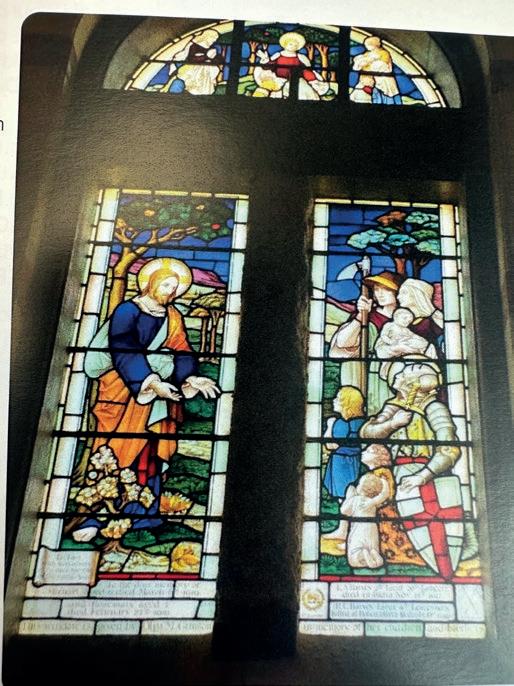
Head of Chemistry:
Mrs P Barker
Head of Biology:
Dr C Turner
Head of Physics:
Mr J Cronin
The Year 7 to 9 Science course at Roedean has been carefully designed in-house to nurture curiosity and a passion for discovery. Through supportive and engaging lessons, students are encouraged to explore scientific concepts and develop practical skills, building a strong foundation of confidence for GCSE Science.
In Year 7, the course begins with an introduction to the principles of working scientifically, followed by topics in Biology, Chemistry, and Physics. Students have three 50minute Science lessons each week, with topics taught on a rotating basis. For example, students might spend approximately three weeks studying a Biology topic before moving on to a Chemistry topic for the next three weeks. Extensive practical work is embedded throughout the course to develop essential skills, boost confidence, and foster a love of hands-on learning and investigation.
To support understanding and preparation for end-of-topic assessments, all students receive a Year 7 to 9 Science Revision Guide and workbook at the start of Year 7.
Biology – This component begins with the fundamental concept of cells. Students will learn how to use microscopes to explore the microscopic world, including preparing their own slides of cheek cells for observation. The course then progresses to studying how cells form tissues and how various organs work together to sustain life. There is a hands-on opportunity to study the skeleton and muscles through dissection. The final topic covers reproduction, exploring plant and animal reproductive processes, including puberty, adolescence, and foetal development.
Chemistry – Students are introduced to the Particle Model. They will develop scientific reasoning behind changes of state and explore various techniques for separating
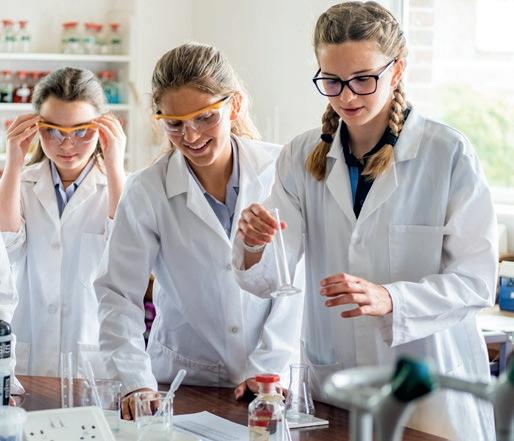
materials. Safe use of the Bunsen burner, a key piece of laboratory equipment, is taught. The course also covers different types of chemical reactions, highlighting how these differ from physical changes. Throughout, there are many practical activities that allow students to witness Chemistry in action.
Physics – The Big Ideas in Year 7 Physics are Forces and Energy. The first topic, Forces and Motion, introduces students to different types of forces and their interactions with objects and one another. Practical investigations allow students to explore factors that influence forces and their effects on objects. The second topic, Heating and Cooling, begins with an understanding of the difference between heat and temperature before examining the states of matter and the ways heat energy transfers between and through them.
Year 8
Biology – Students will explore fascinating topics that are rarely covered at GCSE or A level. This includes an introduction to microbiology, where students learn about microbes, how they cause disease, and the body’s defence mechanisms. Students even can take a swab sample to culture and observe microbes. The course also covers how organisms in the deep oceans survive through chemosynthesis. Additional topics include photosynthesis, respiration, adaptation, inheritance, and extinction.
Chemistry – Students will build on the foundations laid in Year 7, adding deeper knowledge of core concepts. Students study the design of the Periodic Table and investigate the properties of different elements and the materials they form. The course further explores chemical reactions, with students planning and conducting their own investigations into rates of reaction. Key practical and analytical skills essential for advanced Chemistry study are introduced throughout the year.
Physics – The Big Ideas in Year 8 Physics are Electricity and Waves. Students begin by studying electrical circuits, learning about key electrical quantities used throughout their physics education. They build and test circuits, take measurements to understand fundamental circuit laws, and examine safety features in electrical systems. The course then links electricity with magnetism through the study of electromagnets.
In the Waves topic, students explore light and sound waves, identifying their common properties and behaviours. They study how light behaves — including the perception of colour — and investigate how sound is produced, travels, and is detected by the ear.
In Year 9, students begin the foundations of the IGCSE course, which presents a rewarding challenge and excellent preparation for A Level studies.
Biology – Students continue to be taught by a specialist biology teacher. The year starts with an in-depth study of cells, tissues, and organs. They then explore feeding relationships and food chains, including a practical ecology investigation conducted in the beautiful Roedean grounds. To conclude the year, students study the nature and variety of living organisms, learning about the five kingdoms and the fundamental characteristics of all living things.
Chemistry – Building on knowledge gained in Years 7 and 8, Year 9 Chemistry introduces content from the IGCSE syllabus, encouraging deeper thinking. Students examine the particle model in greater detail, explore the differences between elements, compounds, and mixtures, and gain practical experience with various separation techniques. The course also introduces Acids, Bases, and Salts. These topics have been carefully selected to maximise opportunities for hands-on experiments, providing practical experiences that students may not encounter elsewhere.
Physics – The course serves as the foundation for the IGCSE course, with topics closely aligned to Year 10 content. The year begins with a study of energy in systems, including energy transfer and specifically how heat energy moves. Students then investigate forces and pressure, analysing the motion of everyday objects and explaining these in terms of forces. The course concludes by exploring the origins of pressure on surfaces and within fluids.
Roedean offers a wide range of exciting extracurricular opportunities for students passionate about science. Students can participate in the Bronze CREST Awards, designing and conducting their own scientific investigations to develop creativity and independent research skills. Those with specific interests may join the Forensic Science Explorers Club or the Astronomy Club, which provide hands-on experiences and opportunities to explore science beyond the classroom. Aspiring physicists can also challenge themselves through the Physics Olympiad Junior competitions, competing against national standards.
A highlight of the science calendar is the celebration of British Science Week. During this period, students are invited to take part in a variety of activities across the school, supported by the Sixth Form STEM Ambassadors. Recent events have included an immersive tour of the solar system via a visiting planetarium show. Additionally, as part of house competitions, students are encouraged to combine their scientific knowledge with creativity by producing short films, showcasing both their understanding and imagination.
Roedean aims to develop students’ practical and laboratory skills throughout Years 7 to 9. The school recognises that while students enjoy the opportunity to experiment and use a variety of apparatus, laboratories can initially seem daunting. With increasing emphasis on practical understanding in GCSE and A Level examinations, strong laboratory skills are regarded as essential.
In addition to practical skills, the curriculum also focuses on developing ‘soft’ skills such as problem solving and collaborative working. Lessons regularly incorporate a range of activities, from discussions to investigative projects, to support these goals. The school is committed to fostering students’ growth into independent learners by encouraging effective study habits, with prep tasks designed to support this development.
Head of Spanish:
Mrs C Wilson
The study of modern foreign languages in Years 7 to 9 play a vital role in developing students’ communication skills and critical thinking. It also offers valuable insight into other societies and cultures that can only be fully appreciated through language learning, enriching students’ overall experience. The programme aims to build on students’ existing language knowledge and cultural understanding in an interactive, communicative, and challenging way. This approach ensures students gain confidence in the four key skills, listening, reading, speaking, and writing, in at least two foreign languages, providing a strong foundation in preparation for GCSE.
Year 7
Students will develop foundational language skills through engaging topics and key grammar points, including:
• Introducing yourself
• School subjects and opinions
• Family, high numbers and animals
• Use of adjectives in physical and personality description
• Classroom objects
• School subjects and opinions
• Present tense
Year 8
Students will expand their vocabulary and grammatical skills by exploring everyday topics and mastering key verb tenses, including:
• Describe your house and where you live
• Revise present tense and learn some irregular verbs
• Future tense
• Talk about your free time
• Talk about food, eating out and mealtimes
• Use three tenses
• Holidays: use of the preterite tense, countries
• Opinions on activities and reasons
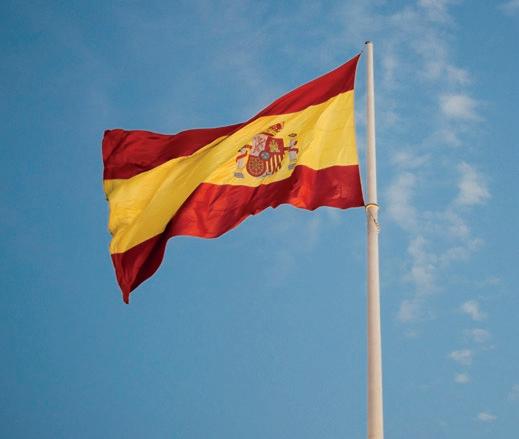
9
Students will develop their ability to express preferences, describe experiences, and discuss everyday topics while refining their use of tenses and broadening cultural awareness through:
• Opinions about music, films, TV programmes and technology
• Clothes, comparatives and superlatives
• Revise how to use 3 tenses
• Talk about pocket money, jobs and future plans
• Talk about eating habits and how to lead a healthy lifestyle
• Learn more about other Spanish-speaking countries and the importance of learning a language
Students have the opportunity to enrich their language learning by participating in national competitions such as Poesiae, Linguistic Olympiads, and language spelling bees.
By the end of Year 9, students will understand and respond to spoken and written language from a variety of authentic sources. They will speak with increasing confidence, fluency, and spontaneity, finding ways to communicate their ideas, including through discussion and asking questions, while continually improving the accuracy of their pronunciation and intonation. Students will be able to write at varying lengths, for different purposes and audiences, using the variety of grammatical structures and tenses they have learned. They will also develop an appreciation of a range of writing in the language studied.
Head of Physical Education:
Mrs C. Baker
The Year 7 to 9 PE curriculum is designed to promote competitive experiences and foster a lifelong enjoyment of sport and physical activity.
Single PE lessons focus on exploration, skill acquisition, and confidence building across a variety of individual and foundational activities.
Double PE lessons aim to develop competitive spirit through team sports, while promoting inclusivity, resilience, and personal growth, empowering all students to excel both individually and as part of a team.
Single PE Lessons – Exploration skill acquisition and confidence
• Athletics: Develop basic running, jumping, and throwing techniques.
• Swimming: Build water confidence, improve technique, and promote water safety awareness.
• Gymnastics: Enhance body control, flexibility, and balance through floor work and apparatus.
• Strength & Conditioning: Introduce bodyweight exercises, posture, coordination, and injury prevention.
• Tennis: Learn racket skills, hand-eye coordination, and developing technique.
• Formative assessment in all lessons through teacher observation, peer feedback, and personal goal setting.
• Summative assessment at the end of each rotation/term focusing on:
• Skill progression
• Effort and engagement
• Teamwork and sportsmanship
• Confidence and willingness to try
• Hockey: Developing physically competent players, developing skills in hockey (mentally competent), developing game awareness & developing hockey intelligence (problem solvers).
• Netball: Developing specific technical skills which enhances confidence and performance, developing tactical awareness through training and match-play, enhancing players physical competence and progress & enhancing teamwork and mental toughness.
• Cricket: Developing technical fundamentals in batting, bowling, fielding and wicket-keeping, promoting tactical strategies in the respective disciplines which enhance performance and understanding, fostering and developing teamwork skills which contribute to increased opportunity communicate effectively, build trust and collaborate with others and cultivate mental skills of patience, focus and resilience.
• Athletics: Refine event-specific techniques and introduce competitive measurement and improvement in any of the disciplines of track and field events.
• Tennis: Develop technical and tactical abilities through application in singles/doubles training and match play, producing increased consistency of the returning, and enhancing understanding of court etiquette and performance variables.
structure overview
Term Single PE Focus (1 lesson/week) Double PE Focus (4 lessons/week)
Autumn Athletics / Gymnastics / Strength & Conditioning / Swimming Hockey
Spring Gymnastics / Swimming / Strength & Conditioning Netball
Summer Athletics / Tennis Cricket / Athletics / Tennis
+44(0)1273 667500 roedean.co.uk
Charity No.: 307063